WORD FROM JERUSALEM
UNDERSTANDING THE SPRING FEASTS (PAGES 4–6)
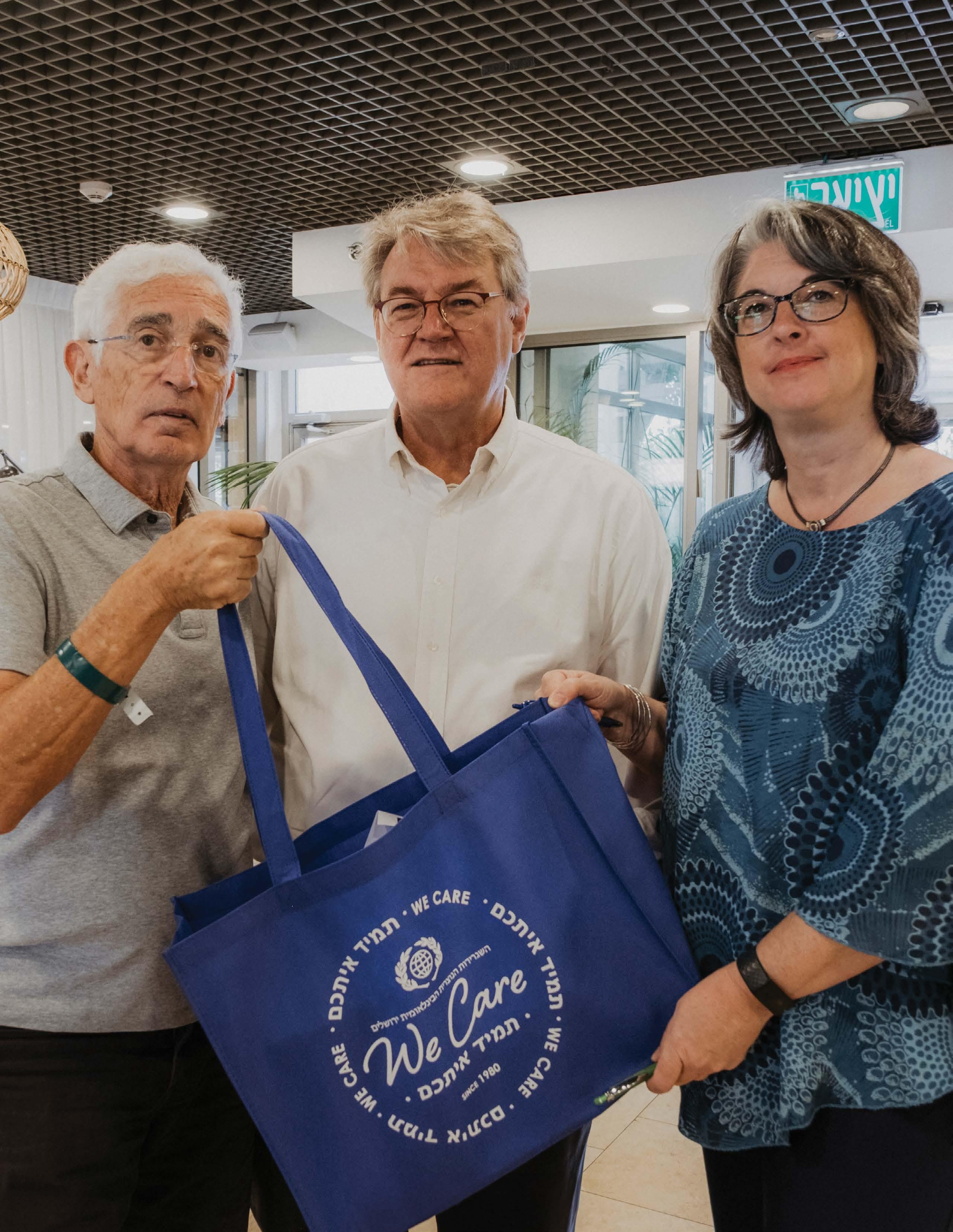
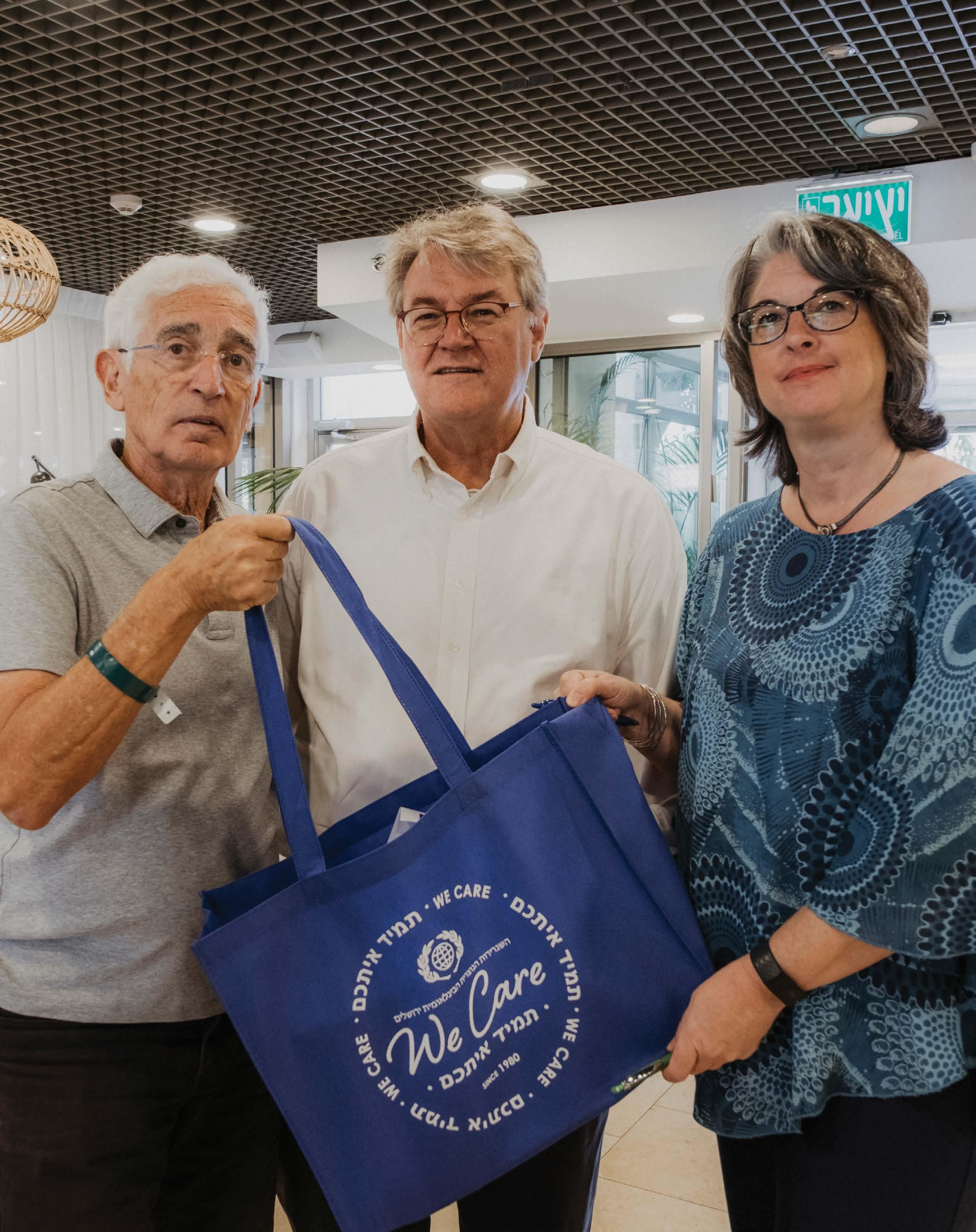
•••
••• INTERNATIONAL CHRISTIAN EMBASSY JERUSALEM // FEBRUARY 2024 // USA EDITION
2023
ICEJ YEAR IN REVIEW
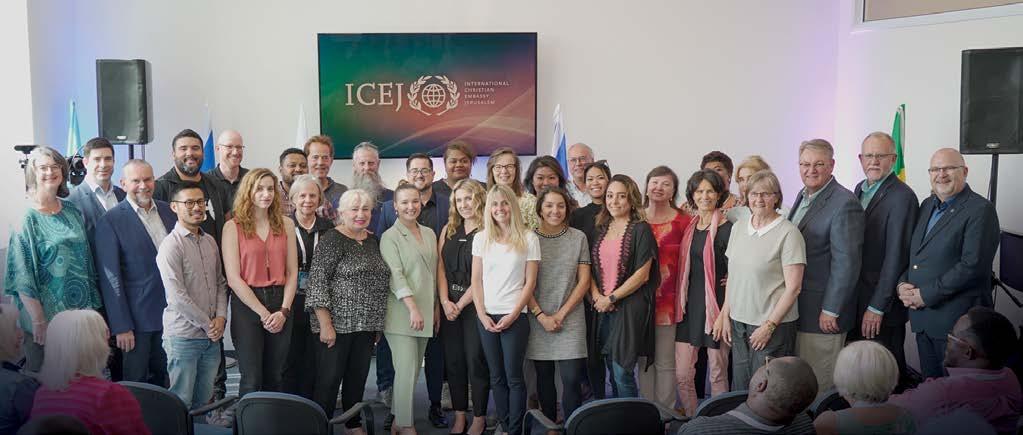

The International Christian Embassy Jerusalem was established in1980 in recognition of the biblical significance of all of Jerusalem and its unique connection to the Jewish people. Today the ICEJ represents millions of Christians, churches, and denominations to the nation and people of Israel. We recognize in the restoration of Israel the faithfulness of God to keep His ancient covenant with the Jewish people. Our main objectives are:
• To stand with Israel in support and friendship
• To equip and teach the worldwide church regarding God’s purposes with Israel and the nations of the Middle East
• To be an active voice of reconciliation between Jews, Christians, and Arabs, and to support the churches and congregations in the Holy Land
From its head offices in Jerusalem, the ICEJ reaches out into more than 170 countries worldwide, with branch offices in over 90 nations. Our vision is:
• To reach every segment of Israel’s society with a Christian testimony of comfort and love
• To reach and actively represent to Israel the support of denominations, churches, and believers from every nation on Earth
The Christian Embassy is a non-denominational faith-based ministry supported by the voluntary contributions of our partners and friends across the globe. We invite you to join with us as we minister to Israel and the Jewish people worldwide by donating to the ongoing work and witness of the ICEJ.
CREDITS
ICEJ President Dr. Juergen Buehler
USA Director Susan Michael
VP International Affairs Dr. Mojmir Kallus
VP Finance David van der Walt
VP Operations Barry R. Denison
VP International Spokesman David Parsons
VP AID & Aliyah Nicole Yoder
Managing Editor/Publications Director Laurina Driesse
USA Managing Editor Karen Engle
Staff Writer Anastasiya Gooding
Graphic Design/Illustrators Ryan Tsuen, Peter Ecenroad, Nancy Schimp
Photography Shutterstock,iStock, Adobe Stock, AP, AFP, JAFI, Flash90, Haaretz, Reuters, IDF, businessweek.com, Netafim, newatlas, SanDisk, Watergen, Waze, Wikimedia Commons, Levi Dörflinger, John Theodor, ICEJ Staff and Branches
The New King James Bible is used for all Bible references unless otherwise noted.
Word From Jerusalem is published by the International Christian Embassy Jerusalem. Reproduction in whole or in part without written permission is prohibited. Word From Jerusalem has no subscription price and is supported through contributions worldwide. The ICEJ USA Branch is a 501(c)(3) non-profit organization with offices in Tennessee, Florida, and Washington, DC. All gifts to this ministry are tax-deductible according to United States law.
INTERNATIONAL CHRISTIAN EMBASSY JERUSALEM - USA
Support our ministry online at: www.icejusa.org
FROM THE PRESIDENT'S DESK

Dear friends,
Here at the ICEJ, we are busy loving, blessing, and comforting the people of Israel like never before. They are still reeling from the events of October 7 and dealing with a war on several fronts—Gaza, Lebanon, Syria, the West Bank, Iraq, Yemen, and Iran, as well as the fight against rising antisemitism and the spiritual battle behind it all.
It’s no secret Israel’s enemies have tried to defeat and discredit Israel using any tactics that stick. One way they’ve done this is by spreading lies about the creation of the State in 1948. On page 18 of this month’s magazine, ICEJ USA Director Susan Michael unpacks five of those lies and how this evil disinformation is impacting global opinion about Israel’s right to exist today.
As you can imagine, since the war started, there has been an overwhelming need for trauma care—yet another “battle.” Even veteran counselors are overwhelmed by the sheer number of people dealing with PTSD. Medical professionals who may have lost friends or family in the massacre or who have loved ones still captive in Gaza are coping with their own trauma while trying maintain home and work schedules. Many feel ill-equipped, but an ICEJ-sponsored resilience and trauma training course for medical professionals and counselors has proved tremendously helpful. You can read more about it on pages 14 and 15 and how it’s aiding participants with their challenges. I’m confident you’ll be encouraged by our other articles that tell of some amazing ways the people of Israel are taking care of each other—and how the ICEJ is helping.
Despite the evil intent of Israel’s enemies to discredit and eliminate her people, the Jewish people are standing strong and unified and facing what lies ahead with hope. But they need our prayers. This war is, without a doubt, a spiritual battle, and we must fight it on our knees. Don’t forget to join us at 9:00 a.m. (EST) for our daily Global Prayer Gathering, where ICEJ and other international leaders provide updates with specifics for how to pray: On.icej.org/ICEJGlobalPrayer
Blessings from Jerusalem,

Dr.
Juergen Buehler
President
International Christian Embassy Jerusalem
COVER PHOTO: Shai Hermesh, a victim of the atrocities of October 7, receives a gift from ICEJ’s Vice President & Senior Spokesman David Parsons and Vice President of AID & Aliyah Nicole Yoder.
FOR MAGAZINE ARCHIVES visit www.icejusa.org/wfj
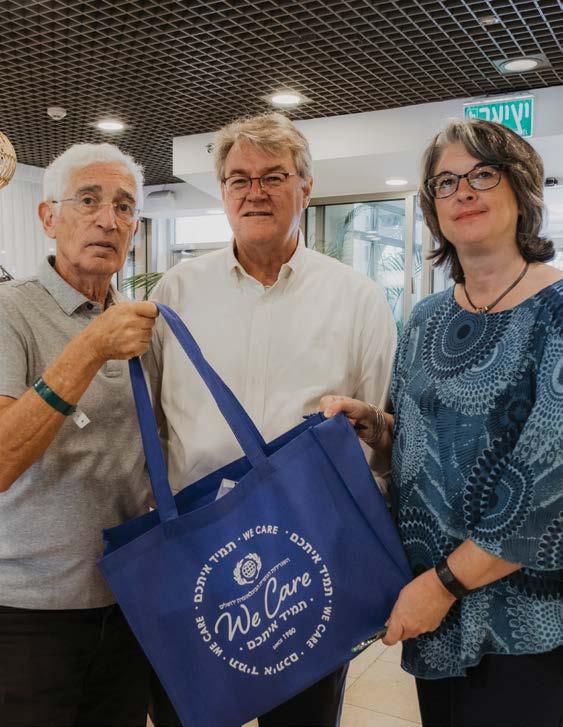
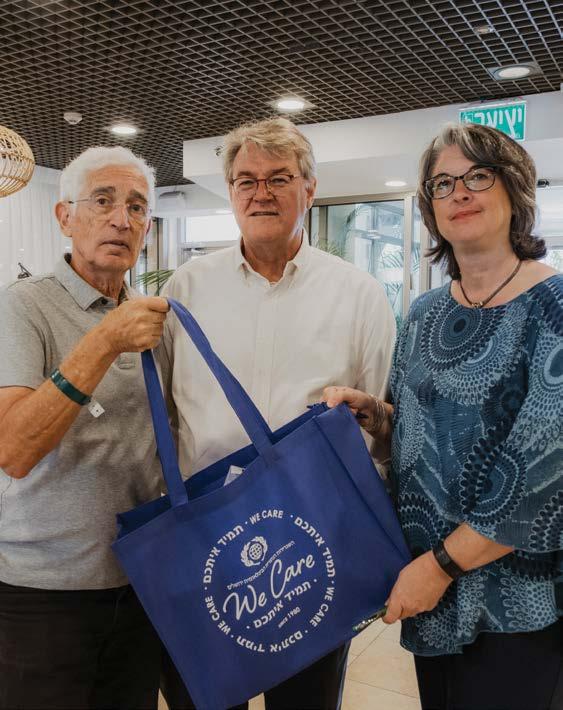
WORD FROM JERUSALEM UNDERSTANDING THE SPRING FEASTS (PAGES 4–6) INTERNATIONAL CHRISTIAN EMBASSY JERUSALEM // FEBRUARY 2024 // USA EDITION ICEJ YEAR IN REVIEW 2023
WORD FROM JERUSALEM

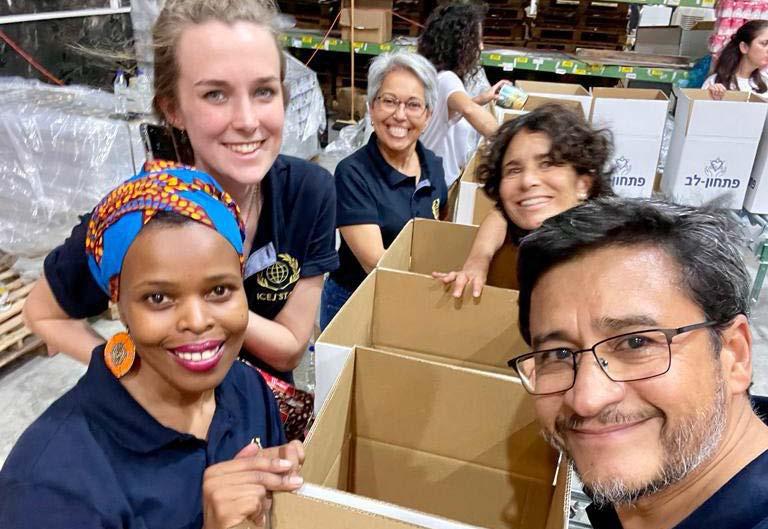
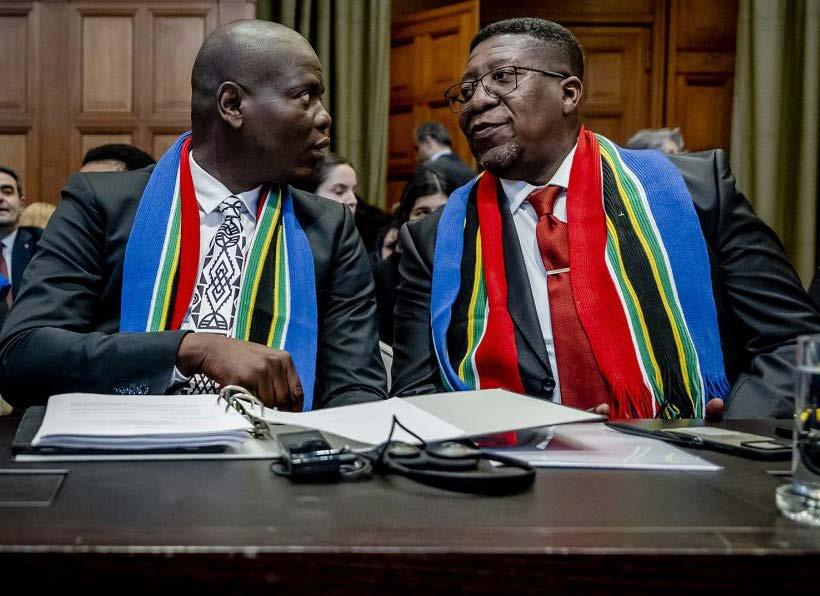
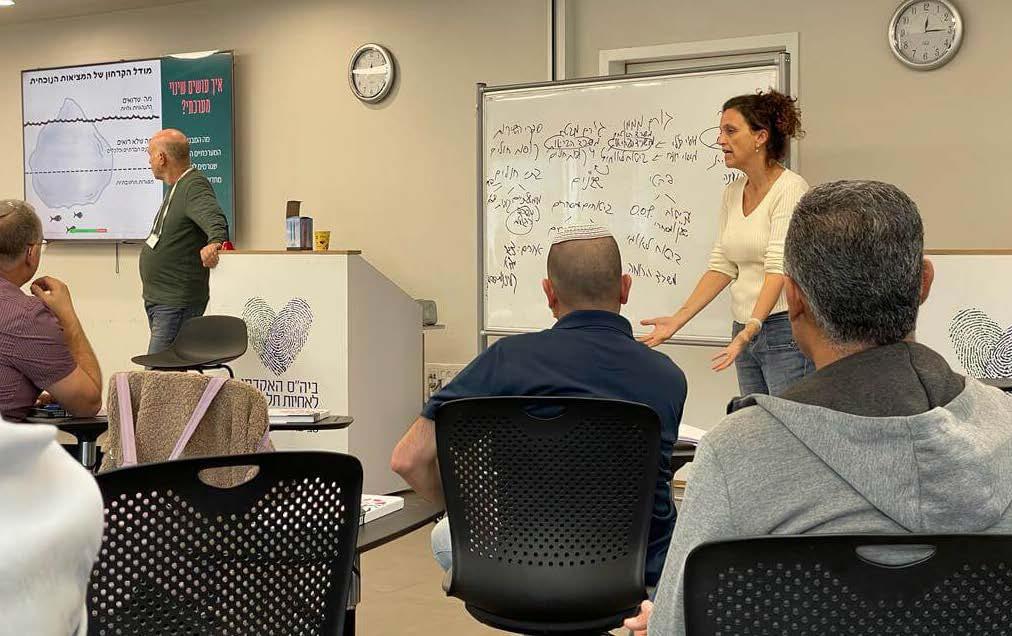
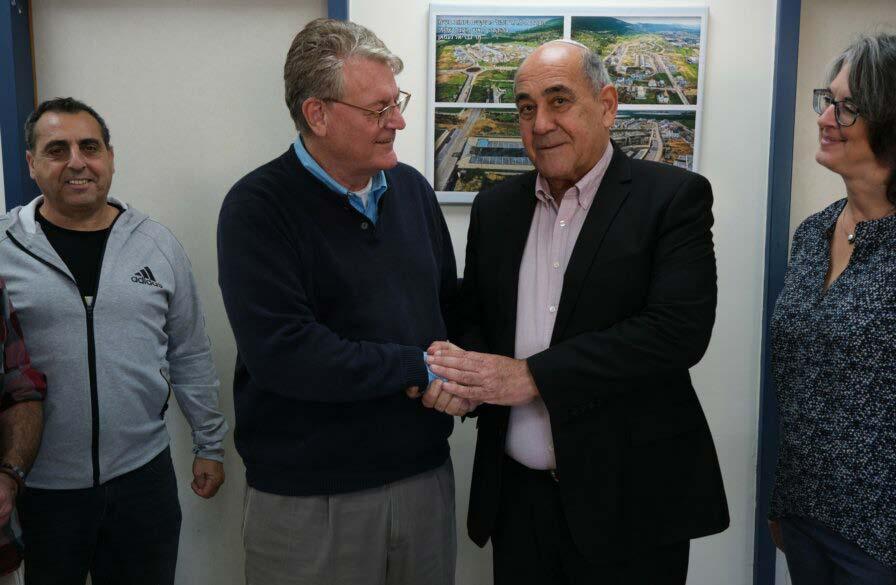
UNDERSTANDING THE SPRING FEASTS And Why They Point to What’s Ahead 2023 ICEJ YEAR IN REVIEW 8 16 ICEJ “SHELTERING” ISRAELIS 12 GENOCIDE PETITION AGAINST ISRAEL
14 ICEJ PROVIDES TRAUMA TRAINING FEATURED TEACHING FEBRUARY 2024 USA EDITION
4
4
UNDERSTANDING THE SPRING FEASTS
And Why They Point to What’s Ahead
KAREN ENGLE, ICEJ MANAGING EDITOR
“Christ is risen from the dead, and has become the firstfruits of those who have fallen asleep.”
—1 Corinthians 15:20
The school I attended from second to eighth grade included Bible as part of the curriculum, and I fondly remember pulling out my small paperback Bible from my desk and reading through several pages daily with my teacher. One year as Easter approached, she planned a simple Passover Seder after we read about Jesus’ death and resurrection. Each student received a little dixie plate with a green herb, a slice of radish, and a cracker. As we tasted each item, she told us they would help us remember Israel’s exodus from Egypt.
I never truly understood why until I was in my 30s when God nudged me to learn more about Passover and all the feasts. And the more I dug into Scripture and read about each, the more God revealed
their significance—and my Bible turned from black and white to technicolor.
Though there are seven Feasts (four in the spring and three in the fall), the spring Feasts—Passover/Unleavened Bread, Firstfruits, and Pentecost—are unique. Through them, thousands of years before Jesus walked this earth, God revealed the significance of His Son’s death, resurrection, ascension to heaven, and promised gift of the Holy Spirit in His plan of redemption.
God’s Spring Feasts
The spring Feasts, or mo’edim (“appointments”), were meant to point the children of Israel to their messiah and illustrate the truth of God’s plan of redemption and its fulfillment through this promised savior.
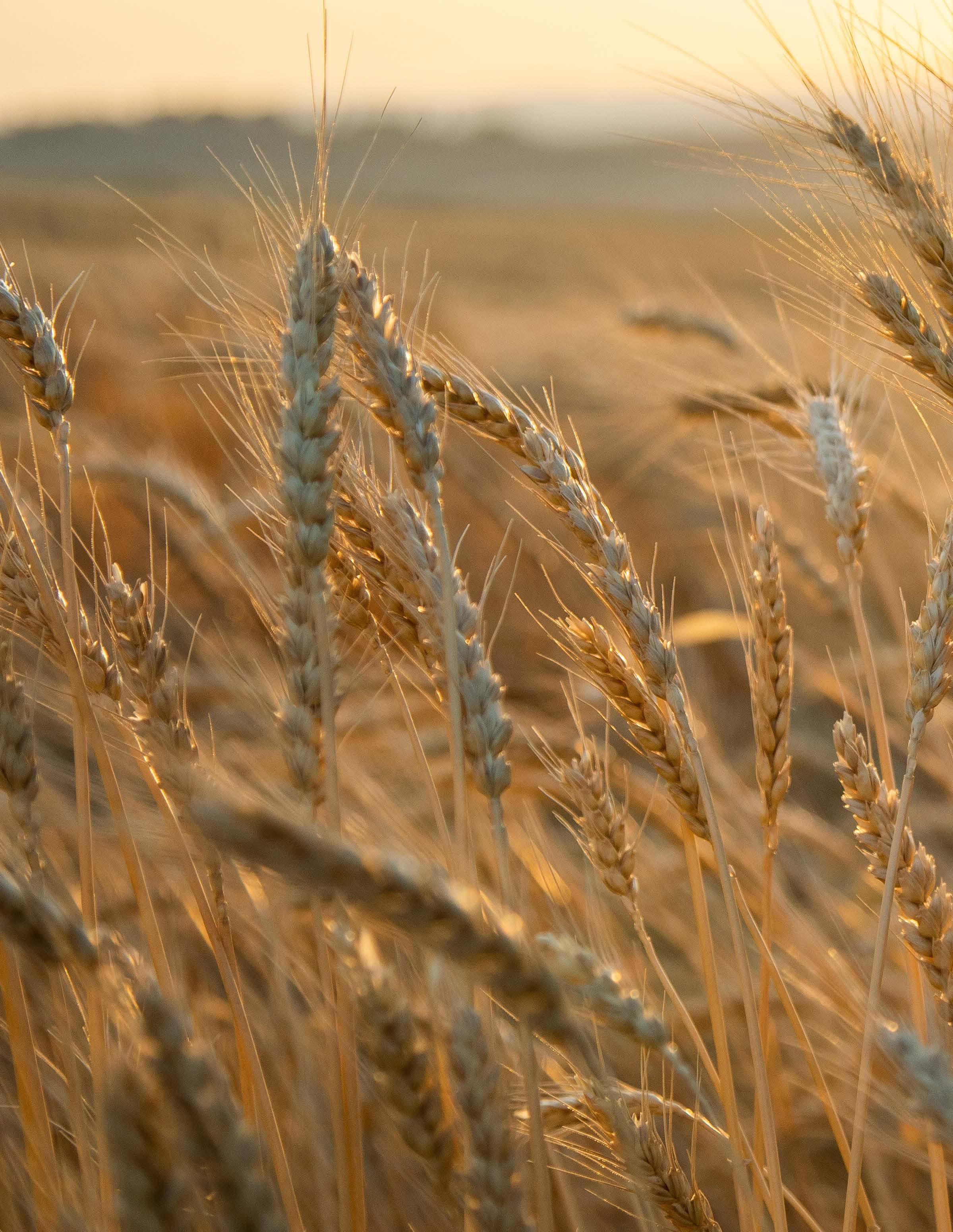
They were set-apart, divine rehearsals of the steps the children of Israel needed to take to be reconciled to their heavenly Father. Rather than mere holidays to be celebrated, like we might celebrate Valentine’s Day or the Fourth of July today, the Lord’s Feasts reveal a pattern of His plan of redemption for all mankind from creation to eternity—and can teach us truths about what’s to come.
Passover and Unleavened Bread
The first feasts on God’s calendar are Passover and Unleavened Bread, and in them, God has revealed profound realities of His plan of redemption.
The story of the Exodus—specifically Exodus 12—provides details about this feast. After almost 400 years of slavery in Egypt, God told
I CEJ FEATURED TEACHING
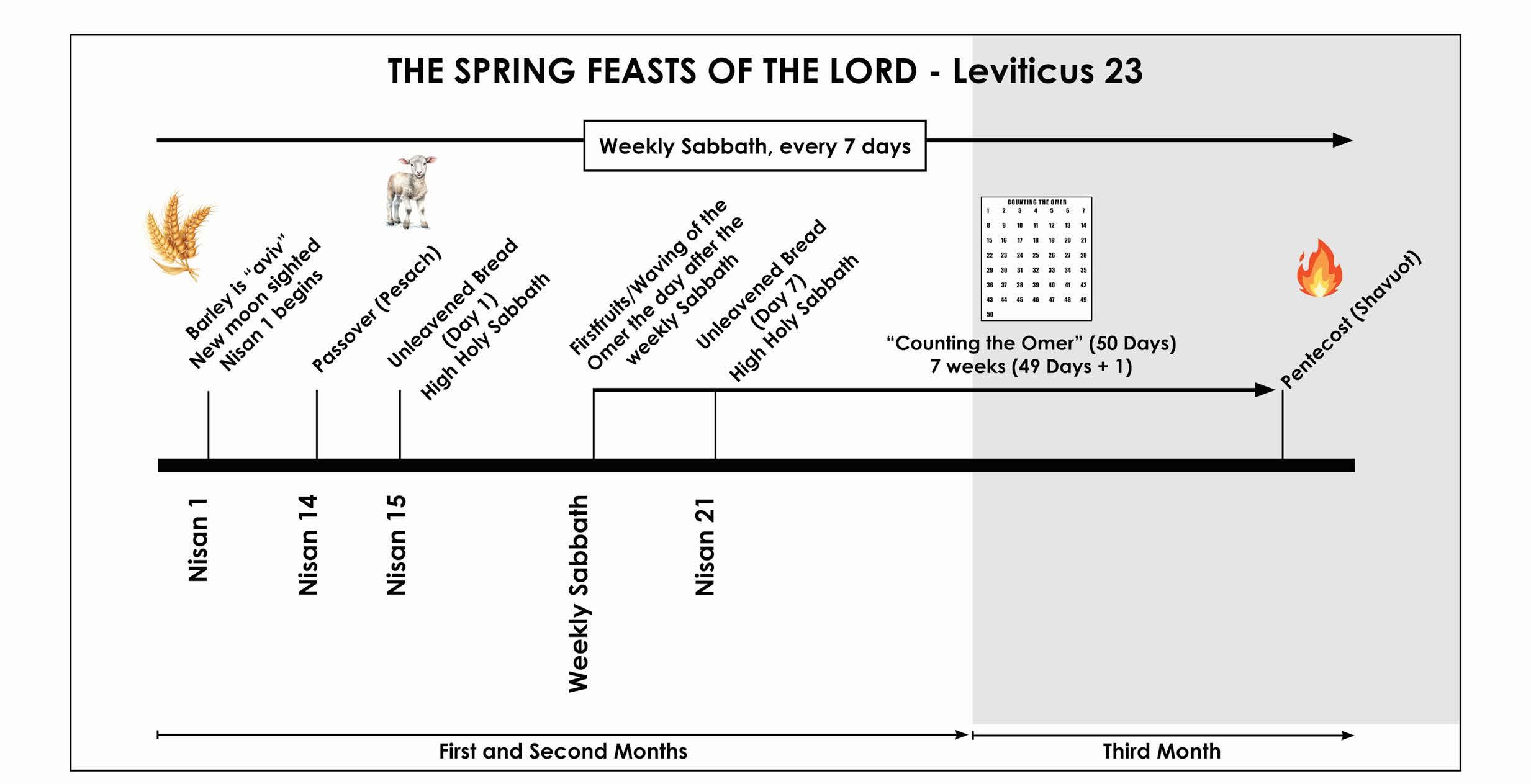
Israel to take a perfect lamb into their homes. They were to care for the lamb for five days, slaughter it at twilight, and put its blood on the lintels of their doors. Passover, or Pesach in Hebrew, means “to skip over,” and indeed, that is what happened. The blood was a “sign” to God: when He saw the blood, the angel of death passed over the house, and the people inside were protected. That same night, God struck all firstborn males in homes without the lamb’s blood on the doorposts, bringing judgment on the gods of Egypt. As a result, Pharoah relented and allowed the children of Israel to leave.
However, the act of sacrificing the lamb and putting its blood on the doorposts was only a “shadow” of a profound reality to come: Jesus’ death on the cross. Just as Israel sacrificed a perfect lamb—its blood over the doors protecting those inside from physical death— so, too, the blood of Jesus, the Lamb of God, protects or “saves” those who trust in Him from eternal, spiritual death.
Unleavened Bread
The seven days of unleavened bread also point to Jesus and the significance of His death and resurrection for those who believe. God told the children of Israel to eat the lamb they had slain that same night before leaving Egypt, along with bitter herbs and bread without leaven. Later, when Israel was in the desert, God told them that for seven days after Passover, they were to continue to abstain from bread with leaven:
On the fourteenth day of the first month at twilight is the Lord’s Passover. And on the fifteenth day of the same month is the Feast of Unleavened Bread to the Lord; seven days you must eat unleavened bread. (Leviticus 23:5–6)
“Leaven,” or yeast, causes dough to rise, and in the Mosaic law, represents sin or corruption. Paul alluded to this in his letter to the Corinthians. He pointed believers to the Feasts of Passover and Unleavened Bread, saying, “a little leaven leavens the whole lump” and called them to “purge out the old leaven, that you may be a new lump, since you truly are unleavened. For indeed Christ, our Passover, was sacrificed for us” (1 Corinthians 5:6–7; see also Galatians 5:9). Like the tiniest speck of yeast in a batch of dough, sin can “puff up” or poison a whole person—physically and spiritually.
Israel’s release from Egypt is a beautiful depiction of our own deliverance from sin and freedom from bondage won by the blood of the Lamb of God. Jesus’ death on the cross removes our sin as far from us as the East is from the West. We are set free and made new—without sin, like an unleavened lump of dough.
Firstfruits
The Feast of Unleavened Bread is a full week long, and therefore, always includes a weekly Sabbath. The day after the Sabbath, the priest took barley sheaves, the firstfruits
of the spring harvest, and waved them before the Lord, acknowledging God’s provision and sovereignty over the earth. Like Passover and Unleavened Bread, this incredible feast, too often overlooked, resounds with profound significance for Christians.
Paul wrote that just as Christ was raised to life, the “firstfruits of those who have fallen asleep” (1 Corinthians 15:20), so too, in Christ, will we be made alive. There is an order of things: “each in turn: Christ, the firstfruits; then, when he comes, those who belong to him” (v. 23 NIV). As Jesus was resurrected to life, those who trust Him will also be resurrected.
In these verses, Paul was alluding to the Feast of Firstfruits, and the lesson was clear: if God was faithful to bring about an early barley harvest, He would be faithful to provide the rest of it. But that was just the “shadow.” The reality (fulfillment) of Firstfruits is Jesus: His resurrection life was an “acceptable offering” to the Lord on the same day the priests presented Israel’s barley firstfruits to God. And just as those first sheaves of barley guaranteed the fullness of the harvest, so, too, Jesus’ resurrection guarantees a greater “harvest” of believers.
Pentecost
Starting the same day God required Israel to bring the sheaf of barley as an offering, Israel was to count off 50 days, called “counting the omer.” (An omer is an ancient measurement of
5 |WORD FROM JERUSALEM
ICEJ FEATURED TEACHING
grain.) On day 50, they were to present before Him another firstfruits offering, this time of the latter firstfruits (wheat). In Hebrew, this Feast is called Shavuot, meaning “weeks,” and in Greek, Pentecost, meaning “50.”
Pentecost was a time of thanksgiving and celebration for God’s faithfulness in providing the spring harvest, and it solidified hope for an abundant fall harvest. Today the Jewish community connects this Feast to the day God descended Mount Sinai in fire and made a covenant with His people, giving them His instruction for living as a set-apart people. Traditionally, Ezekiel 1 is read in Jewish synagogues on Shavuot, which describes Ezekiel’s dramatic vision of God’s glory in a whirlwind and a great cloud, the brightness of which was “like the color of amber” (v. 4).
On Pentecost, God’s very presence descended Mount Sinai on His people. But again, that was only the shadow of this feast! Luke tells us in Acts 2—after Jesus’ ascension, exactly 50 days after His resurrection—as all the believers were together, God’s presence once again descended on His people. This time, however, it was as “tongues of fire,” and each person was filled with God’s Spirit. On that day, what the first-century Jewish believers understood in the physical realm—God’s giving of His Word, His instruction—was made manifest in the spiritual realm. Jesus, God’s spoken Word, now dwelt within His people.
This firstfruits “offering” has become the most famous: the early fruits have come in, and the implicit promise is that the latter “fall” harvest will one day come in too: “The hour to reap has come, for the harvest of the earth is fully ripe” (Revelation 14:15 ESV).
Conclusion
The Feasts are like a skeletal structure upon which God’s story of redemption and the truths of the Bible hang. In Passover and Unleavened Bread, we see Jesus, the perfect, sinless Lamb of God who provides forgiveness from sin through His once-for-all death on the cross. In Firstfruits, Jesus is the acceptable offering for sin. And those who believe in Jesus have His Spirit dwelling in them, the fulfillment of Pentecost: their broken relationship with the Father is reconciled.
Because Jesus perfectly fulfilled the spring Feasts, painting a picture of the work of Christ at His first advent—“Act 1” of His story of redemption—we can confidently trust and look forward with excitement to the three unfulfilled fall feasts, knowing He will complete His story and fulfill them too.
In the next article in our 12-part series on the Feasts, we’ll explore more details of Passover.

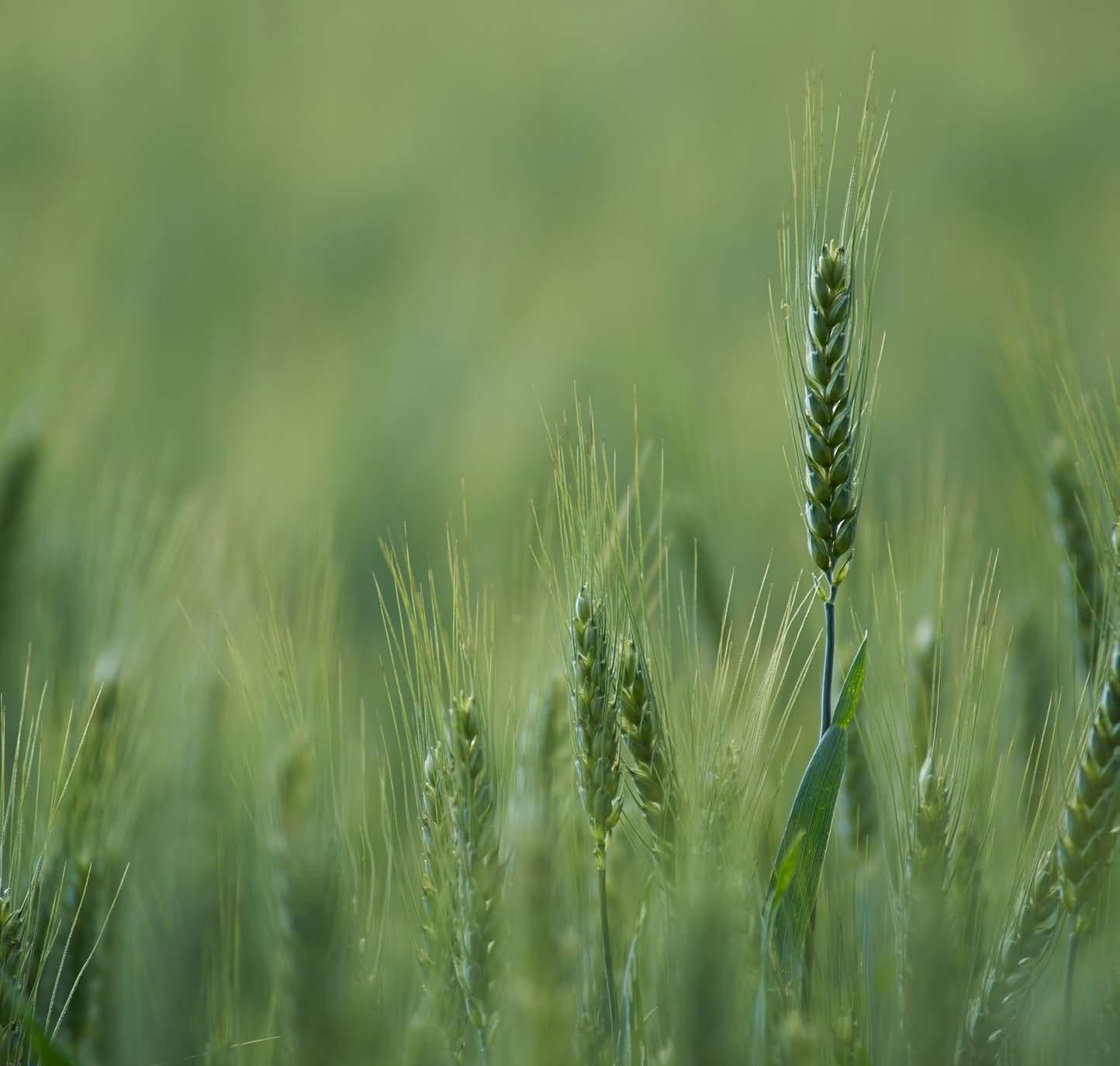
Agricultural Cycles in Israel and the Feasts
For the Lord your God is bringing you into a good land, a land of brooks of water, of fountains and springs, that flow out of valleys and hills; a land of wheat and barley, of vines and fig trees and pomegranates, a land of olive oil and honey; a land in which you will eat bread without scarcity, in which you will lack nothing. (Deuteronomy 8:7–9)
The entire Feast system was closely linked to the agricultural cycle in ancient Israel. In the spring, the most important crops were barley and wheat, both planted in the fall and producing ancient Israel’s main food staple. Legumes and various herbs were also harvested in spring.
Barley was the first to mature (in our March/April), followed by the wheat harvest (May/June). The children of Israel could not eat the barley until the firstfruits of grain had been offered on the “day after the Sabbath” during the Festival of Unleavened Bread (Leviticus 23:9–14)—the Feast of Firstfruits. The Feast of Pentecost (also called the Feast of Harvest in Exodus 23:16) occurred 50 days later at the end of the barley harvest and the beginning of the wheat harvest (Leviticus 23:16–17). Israel’s fruit harvest, including grapes, olives, dates, figs, and pomegranates, ripened and were ready June through September. Olives were picked beginning in September through November.
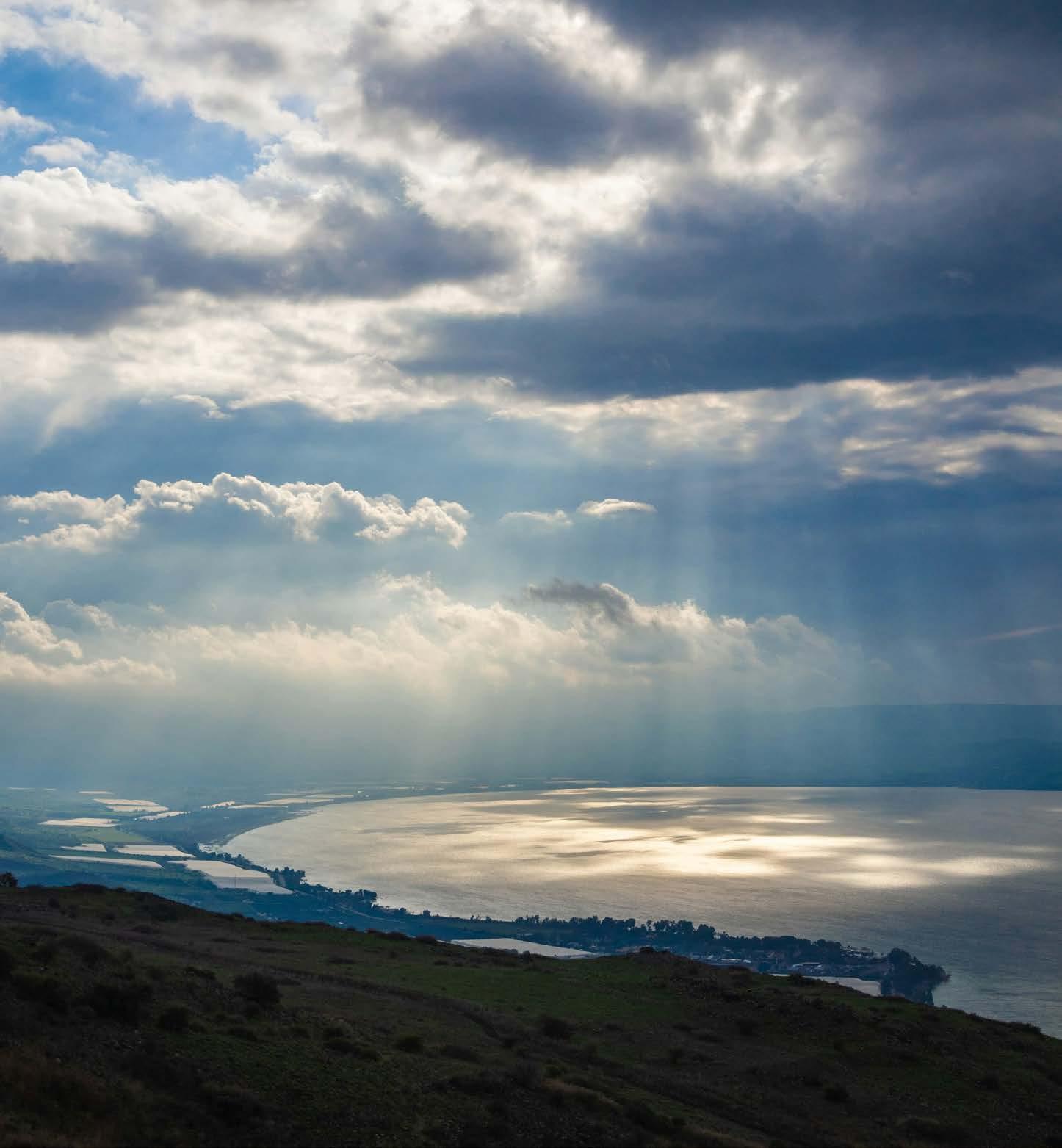
Israel’s Dependence upon Rain
Unlike Egypt, which was irrigated by the freshwater Nile River, much of Israel was dry and arid, making Israel’s harvests entirely dependent on rainfall. Moses affirmed this, saying the promised land “drinks water from the rain of heaven,” (Deuteronomy 11:11). Without rain, there would be no harvest, and the children of Israel would not survive.
Interestingly, rain in the Bible is symbolic of the spiritual refreshment, renewal, and blessing God provides: “For I will pour water on the thirsty land, and streams on the dry ground; I will pour my Spirit upon your offspring, and my blessing on your descendants” (Isaiah 44:3). Rain is often used as a metaphor for God’s Word and its role in nourishing and sustaining our spiritual life:
For as the rain comes down, and the snow from heaven, and do not return there, but water the earth, and make it bring forth and bud, that it may give seed to the sower and bread to the eater, so shall My word be that goes forth from My mouth; it shall not return to Me void, but it shall accomplish what I please, and it shall prosper in the thing for which I sent it. (Isaiah 55:10–11)
Just as Israel needed rain to produce a harvest, the world needs Jesus, the Bread of Life, Living Word, and Living Water, to produce His harvest of believers. He sustains and nourishes those who trust in Him and brings growth and fruitfulness, accomplishing His purpose in our lives.
Deuteronomy 11:14: “I will give you the rain for your land in its season, the early rain and the later rain, that you may gather in your grain, your wine, and your oil.”
6 | FEBRUARY 2024 6 | DECEMBER 2020
ICEJ FEATURED TEACHING
ICEJ USA FEATURED IN GOOD NEWS NEWSPAPER

The January issue of Good News Newspaper, the largest Christian newspaper in America, featured a picture of International Christian Embassy Jerusalem ICEJ USA Director Susan Michael standing in solidarity at a Rally for Israel in Washington, DC, in November. The newspaper also featured two articles on how the ICEJ is providing aid in Israel and fighting antisemitism worldwide. READ THE ARTICLES AT: https://digital.goodnewsfl.org/2024/january/#1
EVERY GENERATION’S STORY
75 Years of American Christian Engagement with Israel
Edited by Dr. Susan Michael – AUDIOBOOK
“If you already love Israel, you’ll be encouraged. If you’re not sure about God’s call for Christians to love Israel and the Jewish people, you’ll be moved. Definitely a recommended read.”
—Rev. Dr. Jim Solberg, Bridges for Peace
This moving anthology follows the unique experiences of 18 American Christians representing five generations who responded to God’s call to go to the land of Israel—and how their time in the Land changed the trajectory of their lives. It’s a labor of love meant to coincide with the 75th anniversary of the birth of the State of Israel. Available now on Amazon.
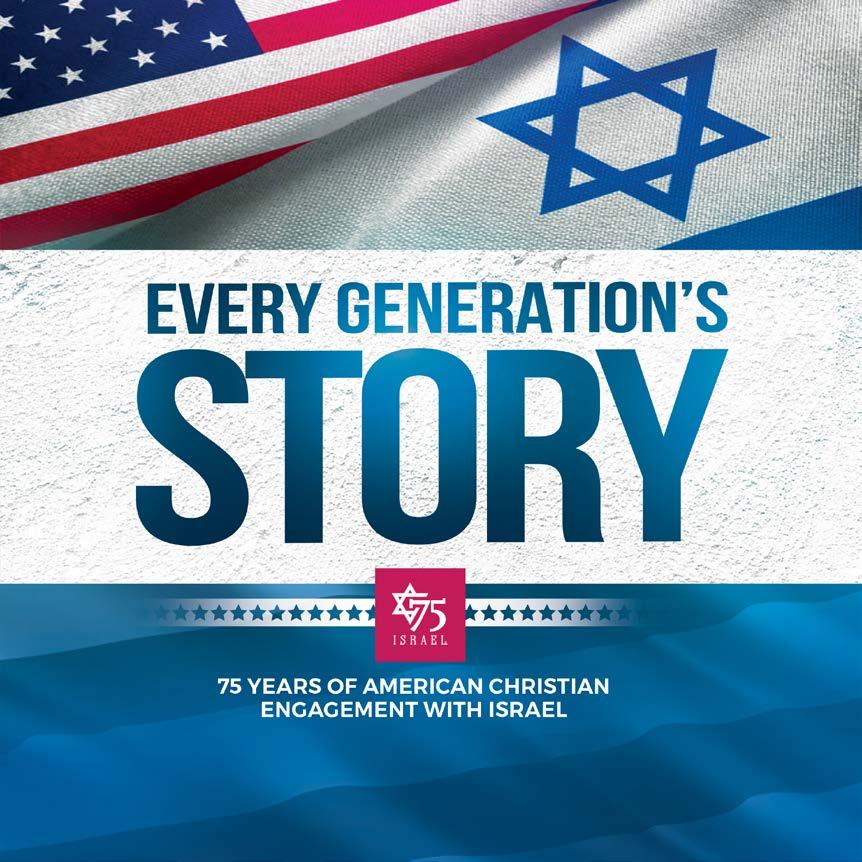

7 | WORD FROM JERUSALEM
AUDIOBOOK
JUST RELEASED! ICEJ REPORT
AUDIOBOOK

2023
ICEJ YEAR IN REVIEW
BY ICEJ STAFF WRITERS
Modern-day Israel turned 75 years old in 2023—what was supposed to be a year of celebration for Israel. Internal divisions, however, dampened the festivities, and then, in one day, all joy dissipated when Hamas terrorists poured into southern Israel on October 7.
Nonetheless, as we reflect over the past 12 months, we see that the ICEJ—thanks to our faithful supporters worldwide—was able to stand strong and bring hope and comfort to all sectors of Israeli society while also helping thousands of Jewish immigrants reach the promised land. We are so grateful for your partnership in this mission and are amazed at what we accomplished together in 2023.
The surge in Aliyah in 2022, largely due to the war in Ukraine, rolled over into 2023. Throughout January, the ICEJ continued to support this urgent wave of ingathering in many innovative ways, such as assisting with Aliyah winter camps for Ukrainian Jewish
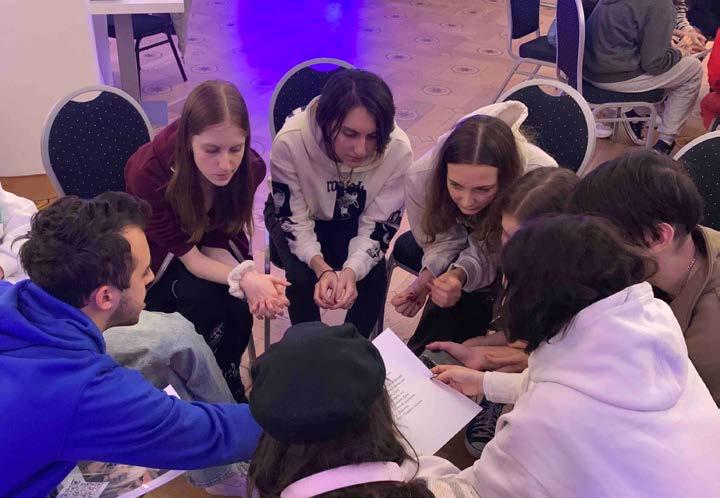
youth in the safety of the nearby Baltic States. The youth, aged 12 to 17, quickly established friendships, embraced their heritage, and learned all they could from Israeli counselors about making Aliyah.
January 27, 2023, marked International Holocaust Remembrance Day, and at an event held in Haifa, the ICEJ was recognized in the presence of Israel’s foreign minister, Eli Cohen, with an award for our work with Holocaust Survivors. Several dozen residents from the ICEJ’s Haifa Home for Holocaust Survivors were present—several even took to the stage to perform a special song together.
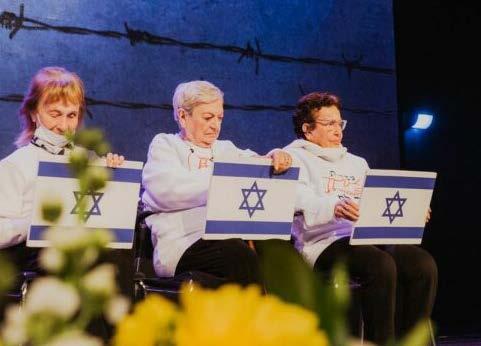
Meanwhile, our annual Envision Pastors and Leaders Conference drew 100 delegates from 25 countries to Jerusalem, while another 130 joined online. Along with visits to key sites in Israel, Envision 2023 featured prominent Christian and Jewish speakers from Israel and abroad who gave rich biblical teachings and informative briefings on current events.
FEBRUARY
On February 1, there was an air of expectancy at Ben Gurion Airport as two flights from Ethiopia arrived carrying Ethiopian Jewish immigrants, young and old. The ICEJ assisted 120 of these new Ethiopian immigrants with pre-flight arrangements and transport to Israel. This occurred even while the ICEJ was still helping hundreds of Ukrainian Jews make Aliyah to Israel one year after the Ukrainian war broke out.
Also in February, shocked by the devastation caused by a massive earthquake in Turkey, Israel rushed to Turkey’s aid. The ICEJ,
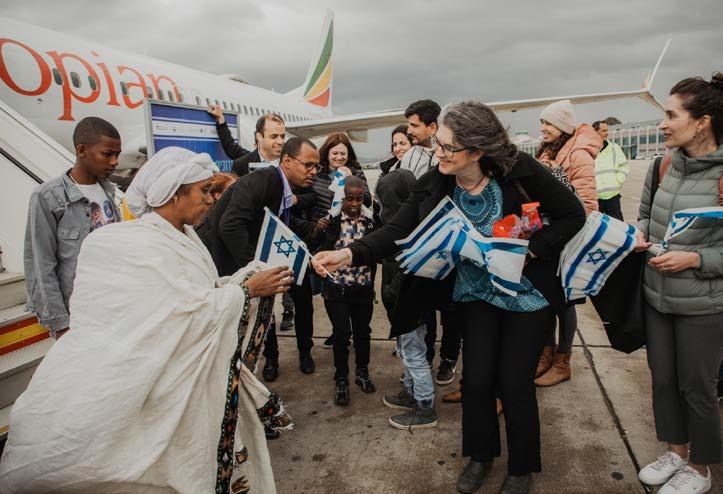
demonstrating Christian compassion, quickly rallied behind an Israeli relief organization to bring aid—warm clothing, first-aid kits, oxygen tanks, defibrillators, and other emergency medical equipment—to some of the hardest hit areas.
MARCH
We were busy with Aliyah this month! Recognizing the urgent need to continue helping Ukrainian Jews immigrate safely to Israel, the ICEJ began sponsoring life-saving Aliyah seminars, giving desperate Ukrainian
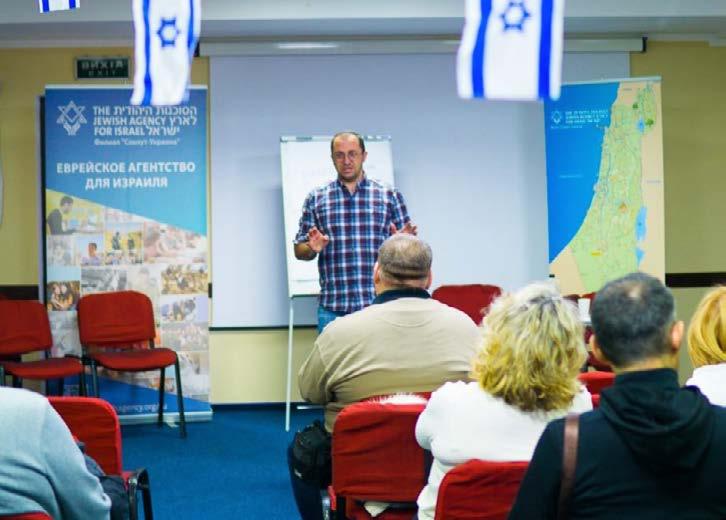
8 | FEBRUARY 2024
JANUARY
ICEJ YEAR IN REVIEW
Jewish families a glimmer of hope and a path to safety. And Ben Gurion Airport was a hive of activity again on March 30, as the Christian Embassy welcomed 155 Ethiopian Jews arriving on an ICEJ-sponsored Aliyah flight!
Meanwhile, ICEJ staff were busy preparing and distributing nearly 800 beautiful holiday gift packages ahead of Passover in early April. These gift parcels included towels, soaps, gift cards with voucher coupons, and many other food and household items. Many recipients
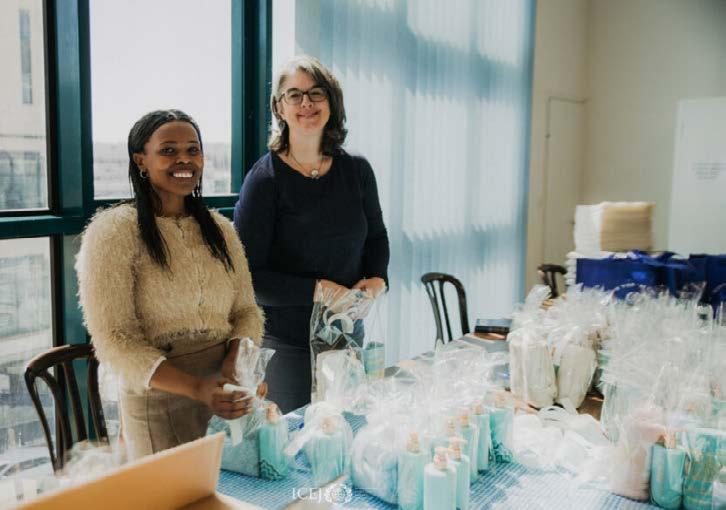
were new immigrants from Ethiopia, Ukraine, and other former Soviet republics, as well as Holocaust Survivors, pensioners, single mothers, and families living below the poverty line.
APRIL
In April the ICEJ supported a weekend Aliyah seminar for young Jewish families in the Baltic States, held at a hotel in Vilnius, Lithuania. The Aliyah seminar drew 52 potential Olim (immigrants) who enjoyed Shabbat together and listened to teachers from Israel sharing about Passover, Shavuot, and the central theme for the weekend: life in Israel.
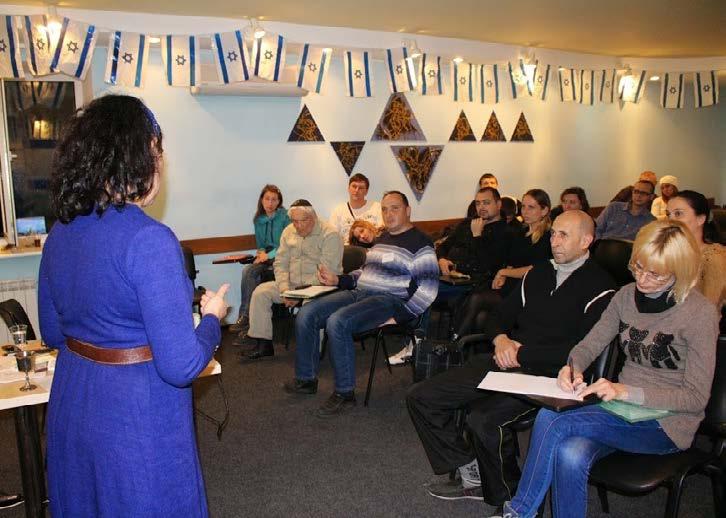
In addition, the ICEJ assisted a family of five from eastern Ukraine in flying to Israel as part of a medical rescue. The grandfather needed regular dialysis treatment and required special help on this flight. The ICEJ covered the flight costs for all five family members and the urgent medical care and housing needed upon their arrival.
Meanwhile, our ICEJ Homecare team encountered special moments as they visited the elderly immigrants in their care, taking along thoughtful Passover gifts for them to enjoy during this special holiday season.
MAY
Israel celebrated turning 75 in May! But sadly, in only three days more than 800 rockets and mortars also rained down on southern Israel from Gaza in May. As the rocket barrage began, the ICEJ was quick to respond by delivering a mobile bomb shelter to a youth center in the Hof Ashkelon region that first afternoon. During this same time, the ICEJ hosted our annual global leadership conference: 30 ICEJ leaders from 18 nations participated in person in Jerusalem, and another 130 delegates from 50 nations joined us online.
The ICEJ also delivered life-saving equipment to one of Israel’s top medical centers. Thanks to your generous donations, the ICEJ was able to donate a blood warmer and three defibrillators to the Kaplan Medical Center in Rehovot.
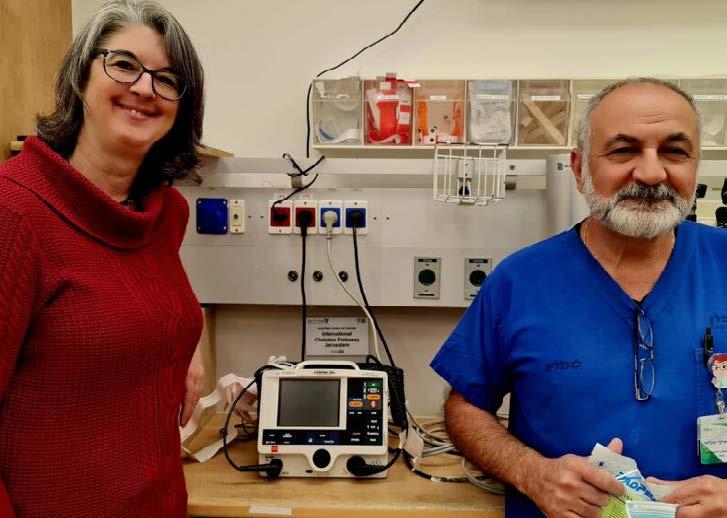
The ICEJ was able to renovate two underground bomb shelters in Kibbutz Dorot in June, located just 8 kilometers (5 miles) from northeast Gaza. Over the years, these shelters had become unusable; contractors renovated the bathrooms, added a small kitchenette area, gave the shelters a fresh coat

of paint, and installed ventilation systems with special pumps that remove moisture from the air to prevent dampness and mold.
The ICEJ also brought relief to an elderly Ukrainian Jewish immigrant by purchasing an air conditioner for her when she was finally able to move into a small one-room apartment. Her long journey began the previous year with a special ambulance from Donetsk in eastern Ukraine to a nearby former Soviet republic, where she needed to update documents to enable her to travel further to Israel. This process took over a month, but she finally flew to Israel accompanied by a medical doctor on an ICEJ-sponsored Aliyah flight.

Also in June, the International Christian Embassy Jerusalem was recognized for our humanitarian work at a special celebration held by the Joint Distribution Committee and the Felix M. Warburg Society. ICEJ USA National Director Dr. Susan Michael was on hand to receive the prestigious annual Warburg Award at a gala event held in New York City.
As of July, the ICEJ had sponsored Aliyah flights for over 1,000 Jewish immigrants in 2023, including 180 from Ukraine, 200 from the Baltic States, and 270 from Russia and other former Soviet republics, plus another
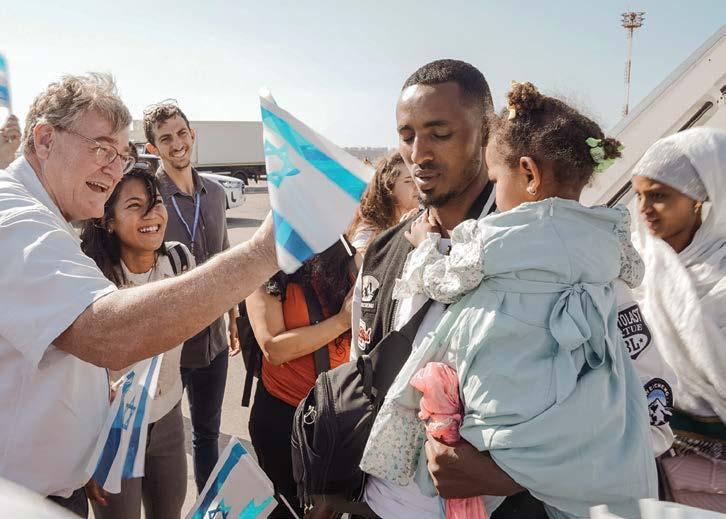
375 from Ethiopia. On July 12, ICEJ staff were on the Ben Gurion tarmac, eager to welcome the arrival of 130 Ethiopian Jewish
9 |WORD FROM JERUSALEM
ICEJ YEAR IN REVIEW
JUNE JULY
immigrants who were making Aliyah on a flight sponsored by the ICEJ.
Over the summer months of June to August, the ICEJ also sponsored three Baltic Summer Camps in Latvia and Lithuania for Jewish children. In all, over 1,000 Jewish youth participated in the camps, many of them Ukrainian Jews. These camps are essential for helping young people learn about life in Israel and establishing building blocks for future Aliyah.

in September on a flight sponsored by our supporters worldwide. With these latest arrivals, the number of ICEJ-funded Aliyah flights rose to 813 Jewish immigrants who had left the former Soviet republics for safety and the hope of a brighter future in Israel.
Also in September, it was an extra joy for the ICEJ to partner with local Arab Christians to remember and bless Holocaust Survivors with 110 Rosh HaShana gift baskets to start the fall High Holy Days.
The ICEJ helped with urgent food distribution and humanitarian efforts to assist evacuated Israeli families, the elderly, new immigrants, and other needy families nationwide, including:
• Packing over 14,000 food boxes for evacuated families
When Israeli authorities asked the ICEJ to help rescue Ethiopian Jews from fighting in Gondar, we did not hesitate. The Jewish Agency took care of a group of 61 Ethiopian Jews eligible for Aliyah, and the ICEJ helped fund their Aliyah flights to Israel and absorption costs once in the land.
Over the past decade, the ICEJ has donated nearly 200 mobile bomb shelters to vulnerable Israeli communities, most going to towns along the Gaza border area—but by August of last year, we had already placed some 50 shelters in northern Israel. Thanks to the generous donations of a Swiss Christian family, we delivered six new bomb shelters to the town of Shlomi, right on the border with Lebanon, which had been hit by a barrage of Hamas rockets at Passover.
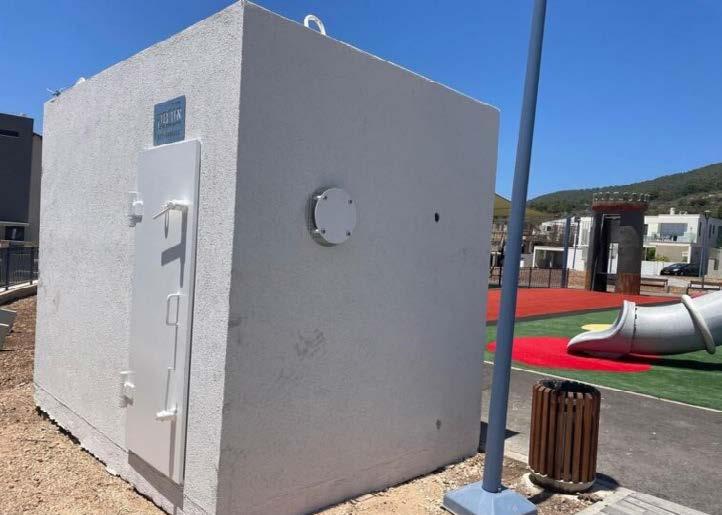
Meanwhile, the ICEJ also sponsored recertification courses for licensing new immigrant doctors to practice medicine in Israel.
When hearing about the well-worn conditions of the living quarters of new immigrants at Kibbutz Merchavia, we also stepped in to help renovate the homes to make them more comfortable for these newly arrived Jewish families.
AUGUST SEPTEMBER
The ICEJ’s staff welcomed 26 Jewish high school students from war-torn Ukraine to Israel, who arrived at Ben Gurion Airport
Then on September 29, the ICEJ welcomed over 3,000 Christians to Israel for our annual Feast of Tabernacles celebration, while several thousand more joined us on our online streaming platform to celebrate under the biblical theme “King of All the Earth.”
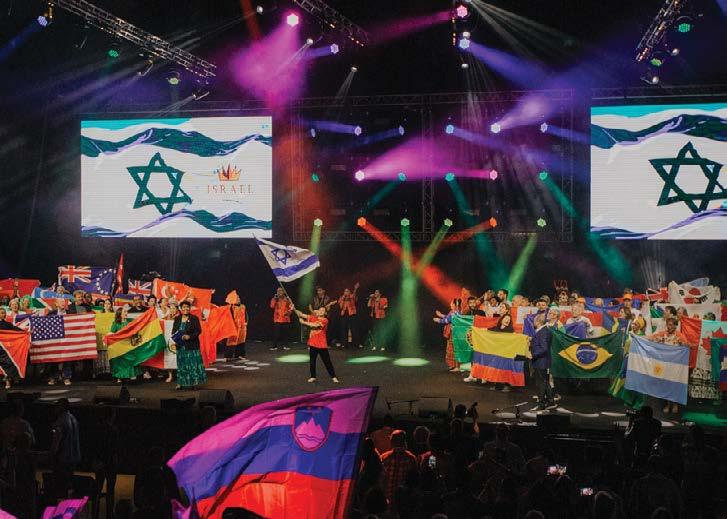
OCTOBER TO DECEMBER
Our weeklong Feast celebration concluded on October 6, and the very next morning, the nation of Israel was shocked and appalled by the treacherous mass infiltration of Hamas terrorists from Gaza on the Jewish high holy day of Simchat Torah. The ICEJ’s response was immediate, with an ongoing threepronged approach to helping the Jewish nation, which we sustained over the final three months of 2023.
This three-pronged approach included:
• PRAYER: A daily online Global Prayer Gathering to pray for Israel that thousands joined each day, plus a 24/7 Rosh Chodesh prayer chain and recurring Esther Fasts
• SOLIDARITY: Public rallies and prayer events to stand in solidarity with Israel hosed by ICEJ branches worldwide
• RELIEF AID: Numerous activities and projects to bring war relief aid to Israelis still reeling from the events of October 7
Relief aid included what follows:
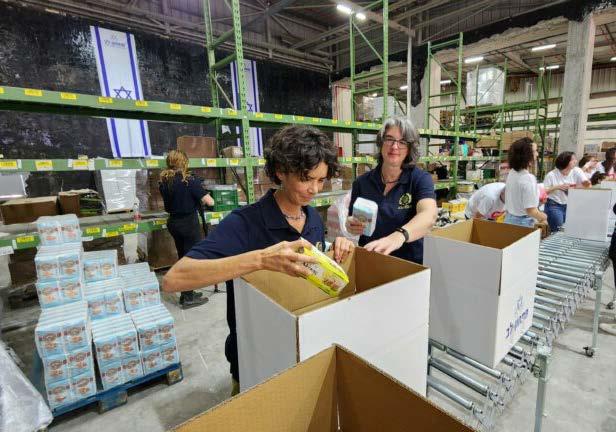
• Leasing two delivery trucks to distribute food packages to evacuated and disadvantaged families
• Providing food and water to first responders near the Gaza border
• Hosting BBQ cookouts for those defending the country
• Sponsoring a mentoring program and aid basket for 40 vulnerable families from the heavily impacted areas of Ofakim, Ashdod, and Ashkelon
The ICEJ assisted scores of Israeli evacuee families with housing, emergency aid, educational needs, and emotional support, including:
• Providing respite days for 450 evacuees, hosted at Yad HaShmona, for new immigrants living near the Gaza border and other families from the South
• Providing gift cards for 440 evacuee families from Kfar Aza and Sderot
• Hosting 18 evacuees, including providing food and emergency items
• Providing children with basic needs like toys, games, mattresses, first aid kits, food, etc.
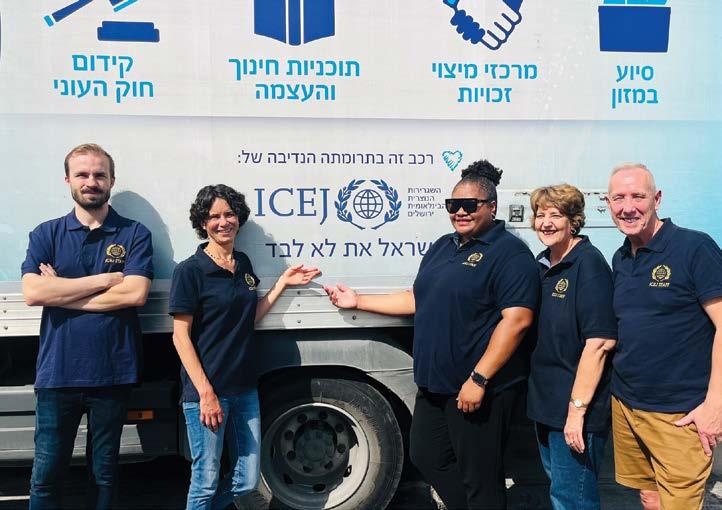
10 | FEBRUARY 2024
and Support for Needy Families
Evacuees ICEJ YEAR IN REVIEW
Food
Helping
• Sponsoring activities, therapy and/ or emotional support for some 1,000 evacuee children, some with disabilities
• Supplying computers for children in 10 evacuee families
• Establishing 11 classrooms for evacuated children with equipment and books
• Giving 250 bags packed with toys to children of evacuated families in Haifa
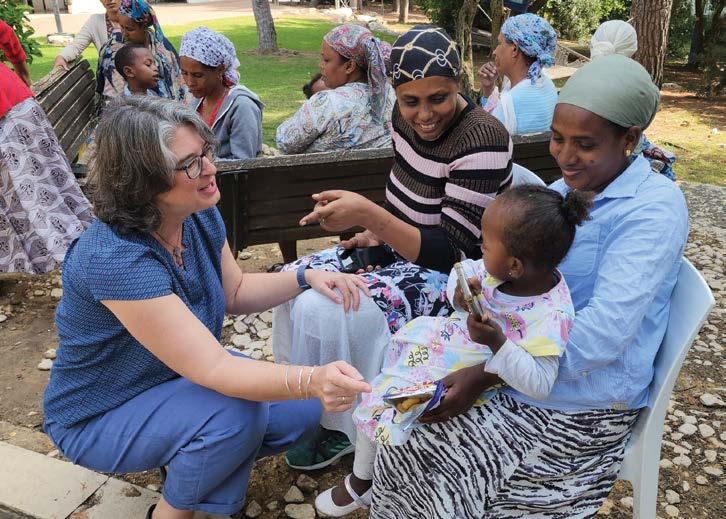
• Funding the printing of 4,000 books to help traumatized children in evacuated families, published by the already reopened print house in the hard-hit community of Kibbutz Be’eri
The ICEJ made a special effort to assist Holocaust Survivors during this crisis by:
• Purchasing emergency food supplies and a back-up generator for Holocaust Survivors at the Haifa Home
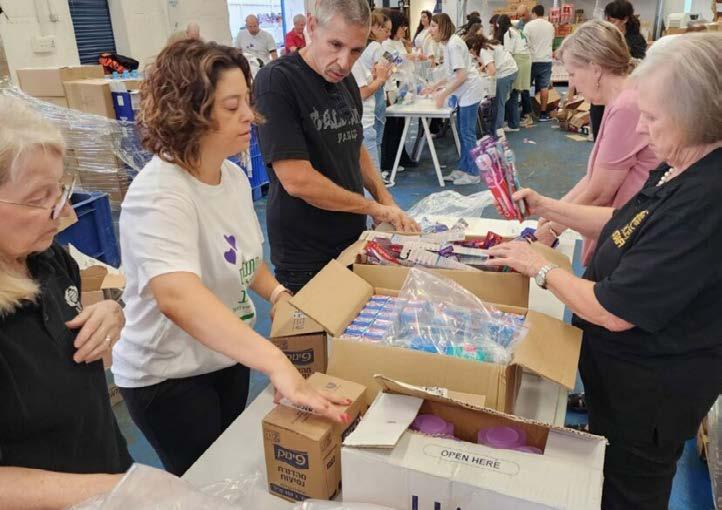
• Providing Survivors with mattresses, toiletries, etc.
• Supplying food for Survivors across northern Israel
The ICEJ donated medical and emergency equipment, including:
• Protective helmets and vests, search and recovery tools, first aid and medical intervention equipment, and other emergency supplies for 30 paramedics and search and rescue workers
• Four new ambulances, including one for Kibbutz Be’eri
• One new Medi-scooter
• Four medical packs and four defibrillators for security officers in Hof Ashkelon
• Four new fire-fighting ATVs to combat fires ignited by Hamas rockets hitting the western Negev
• Warm clothing, tents, and other outdoor equipment for those on the frontlines
• More sets of special radio transmitters— like those that helped save thousands of lives on October 7—for communities along the Gaza border
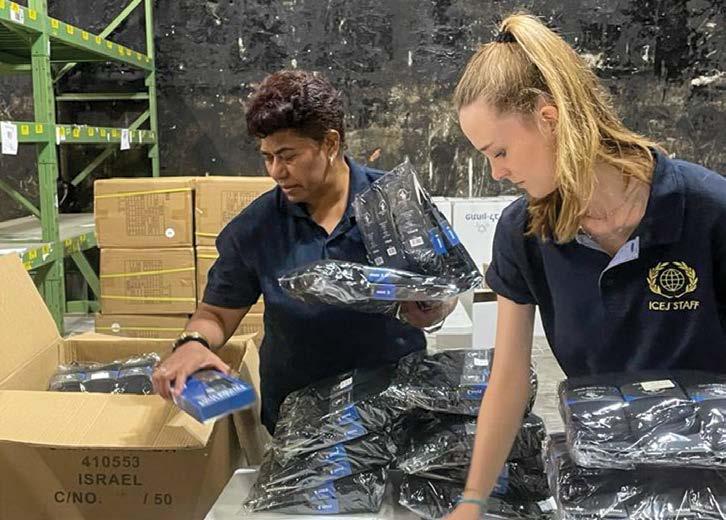
The ICEJ placed more portable bomb shelters and renovated existing underground shelters in the North and South of the country, including nine new above-ground mobile shelters. We also helped renovate 120 existing underground shelters, including 73 shelters in Shlomi, 41 in Ma’alot-Tarshiha, and 6 in central Israel.
The ICEJ sponsored trauma training, counseling, and care for hundreds of Israelis severely shaken by the conflict, such as:
• Providing leadership and resilience training and support for 120 doctors and nurses responsible for over 1,500 medical staff
• Providing trauma therapy and emotional support to evacuated teens and at-risk young adults
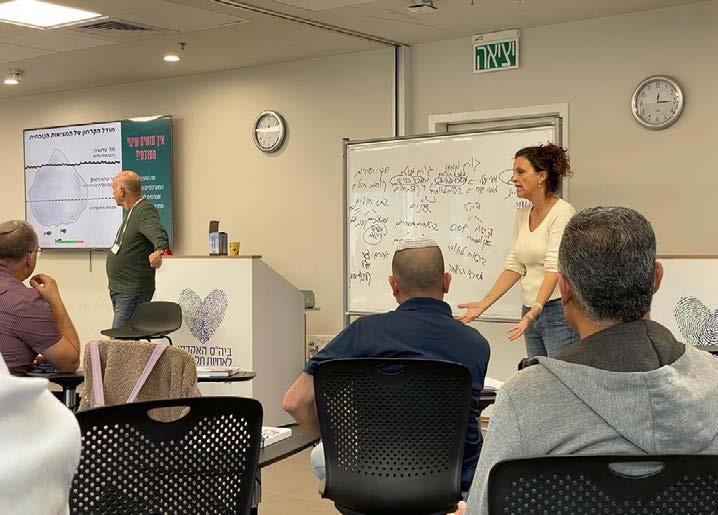
• Providing horseback riding therapy sessions and equipment for traumatized children.
• Helping with a PTSD trauma center in the North for IDF veterans and others
• Helping with a treatment center renovation in Jerusalem that cares for hundreds of Israeli soldiers and civilians suffering from PTSD
The ICEJ staff engaged in hands-on volunteer work to help Israelis in several areas, including:
• Packing food boxes for over 14,000 evacuees, as well as 4,900 toiletry kits for IDF soldiers
• Visiting wounded IDF soldiers and civilians and giving out 19 gift bags
• Visiting evacuee families from Kfar Aza and sitting shiva (mourning) with them.
• Visiting dozens of elderly and disabled Israelis needing physical and emotional support
• Harvesting fruit trees and crops for farmers in the western Negev.
• Volunteering to drive pregnant women to the hospital to give birth

Many of these urgent war relief efforts over the last few months of 2023 have continued into 2024. We want to thank you so much for your incredible support throughout the year of 2023. It is only because of your generosity that the Christian Embassy achieved all that it did, reaching out to many people to bring hope and comfort to a nation still stunned by the hatred and terror surrounding it. We look forward to continuing our partnership with you in the coming year to meet the needs of the nation and people of Israel.
Please give to: www.icejusa.org/donate-online/
Holocaust Survivors
Medical and Emergency Equipment
Bomb Shelters
Trauma Response
11 |WORD FROM JERUSALEM ICEJ YEAR IN REVIEW
Hands-On Volunteer Work

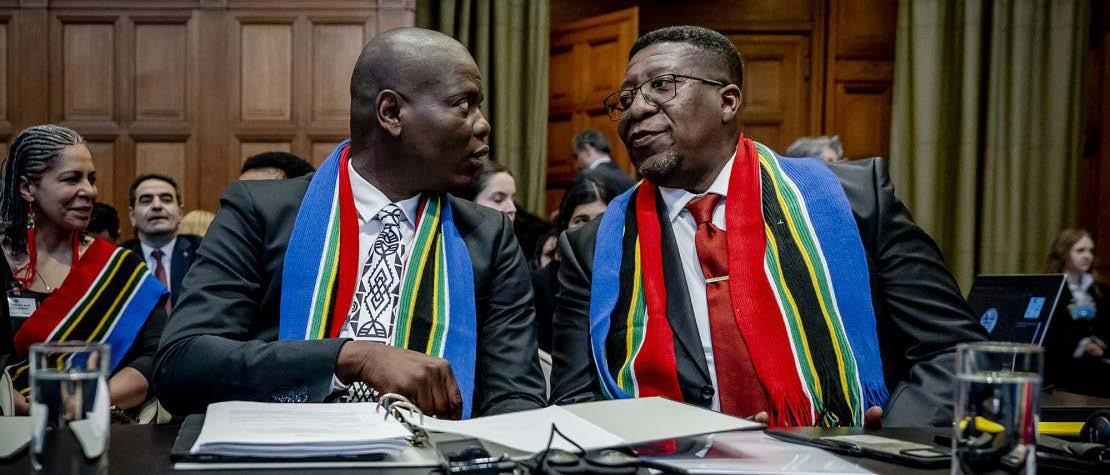
JUSTICE INVERTED IN GENOCIDE PETITION AGAINST ISRAEL
BY DAVID R. PARSONS, ICEJ VICE PRESIDENT & SENIOR SPOKESMAN
When waves of Hamas terrorists infiltrated from Gaza and proceeded to slaughter, torture, rape, maim, and kidnap thousands of Israelis last October 7, President Isaac Herzog rightly described it as the darkest day for the Jewish people since the Holocaust. The Hamas onslaught was certainly not on the same scale as the Nazi mass extermination of over 6 million Jews, yet several Holocaust Survivors themselves have told us what happened that day was actually worse than what they suffered from the Nazis in terms of the brutality, malice, and perverse glee shown by the perpetrators.
This is why the legal stunt by South Africa’s ANC-ruled government to drag Israel into the International Court of Justice on the charge of genocide is so twisted and odious.
Turning the Holocaust on Its Head
The hearings at the ICJ in The Hague are a clear example of what scholars on modern-day antisemitism call “Holocaust inversion.” It goes beyond Holocaust denial or distortion, such as the claim by Palestinian leader Mahmoud Abbas that only 600,000 Jews died, or his more recent assertion that the Palestinians have been through “50 holocausts.” Rather, it turns the Holocaust on its head by portraying Israel as just as bad as the Nazis, if not worse. And if such is the case, it follows that the Jewish State and people today deserve to be eradicated.
To fully expose this grotesque ruse, let’s start with these simple historic facts. First, the Jewish people were indeed the victims of the world’s cruelest campaign of industrialized slaughter at the hands of the Nazis and their accomplices during World War II. There was not even a word yet to adequately describe the enormity of the Nazis’ crimes, so in 1944, Polish Jewish Lawyer Raphael Lemkin coined the term “genocide.”
Following the Second World War, the international community not only established the United Nations as a bulwark against such widescale massacres in the future, but they also enacted a specific treaty to ban this most extreme crime of genocide.
Genocide Defined
The Convention on the Prevention and Punishment of Genocide adopted in 1948 defines genocide as the deliberate killing of a large number of people from a particular nation or ethnic group with the aim of destroying that nation or group. This uniquely heinous crime must involve systemic acts of mass murder and also show proof of a mens rea—a specific mental culpability of “intent” to wipe out another people or race.
In the time since the treaty was enacted, there have been several clear acts of genocide worldwide, such as the Hutu tribe’s mass slaughter of Tutsis in Rwanda and the Khartoum regime’s massacre of non-Arabs in the Darfur region of Sudan.
Oddly, post-apartheid South Africa was never bothered enough by any of these genocide campaigns to bring their perpetrators to trial at the International Court of Justice in The Hague. Instead, South African leaders have even welcomed the butchers of Sudan in Pretoria.
So why is South Africa now concocting an indictment of genocide against Israel?
The answer starts with the close ties that the ANC and PLO forged as radical Marxist liberation movements backed by the Kremlin in the Cold War days. The Soviets spoon-fed them anti-Western, anticolonialist propaganda that viewed the State of Israel as a Western, colonialist implant amid the Arab world. Even though the late Nelson Mandela himself accepted Israel’s right to exist, the ANC today remains extremely hostile toward the Jewish State. They helped turn the 2001 Durban Conference on racism into an antisemitic hate-fest and now are even willing to serve as legal counsel for Hamas before the world’s highest court.
But their case is extremely flawed and was poorly presented in the opening hearings at the ICJ on Thursday, January 11.
12 | FEBRUARY 2024
ICEJ COMMENTARY
South Africa’s legal team inside The Hague, joined by Justice Minister Raymond Lamola (left) and Ambassador Vusi Madonsela
To begin, there is a certain hierarchy to international criminal law that goes from basic war crimes to crimes against humanity that “shock the world’s conscience” to the ultimate crime of genocide. So why jump straight to the highest crime, which is hardest to prove?
Well, it just so happens that war crimes and crimes against humanity are generally both dealt with by the International Criminal Court, also seated in The Hague, and Israel is one of many countries that have yet to sign on to that court’s founding treaty—the Rome Statute. Nonetheless, the Palestinians are seriously pushing a war crimes probe against Israel at the ICC, but that will take time.
Meanwhile, Israel has signed the Genocide Convention, and since it is an international treaty, any disputes arising under it between UN member states can be brought before the International Court of Justice for adjudication. That is why South Africa went straight for the highest crime of genocide, and it is why Israel had little choice but to accept the court’s jurisdiction and will now show up on Friday with a strong legal team to defend itself.
homes or at an outdoor music festival. They also skipped all the rapes, mutilations, and beheadings by Hamas.
They left out the more than 240 hostages taken back into Gaza, with more than half still being cruelly held in harsh conditions almost 100 days later. They likewise made no reference to their being held in the hundreds of miles of terror tunnels built with wasted foreign aid funds. They ignored how Hamas deliberately uses Gazan civilians as human shields and places weapons and rocket launchers in schools, mosques, and hospitals. They were silent about all the extraordinary measures the IDF has taken to protect civilians in Gaza, such as the millions of phone calls and dropped leaflets warning them to flee the area due to impending military operations. They forgot to talk about the hundreds of aid trucks being allowed into Gaza every week, as well as fuel—even though denying fuel to an enemy is not a war crime.
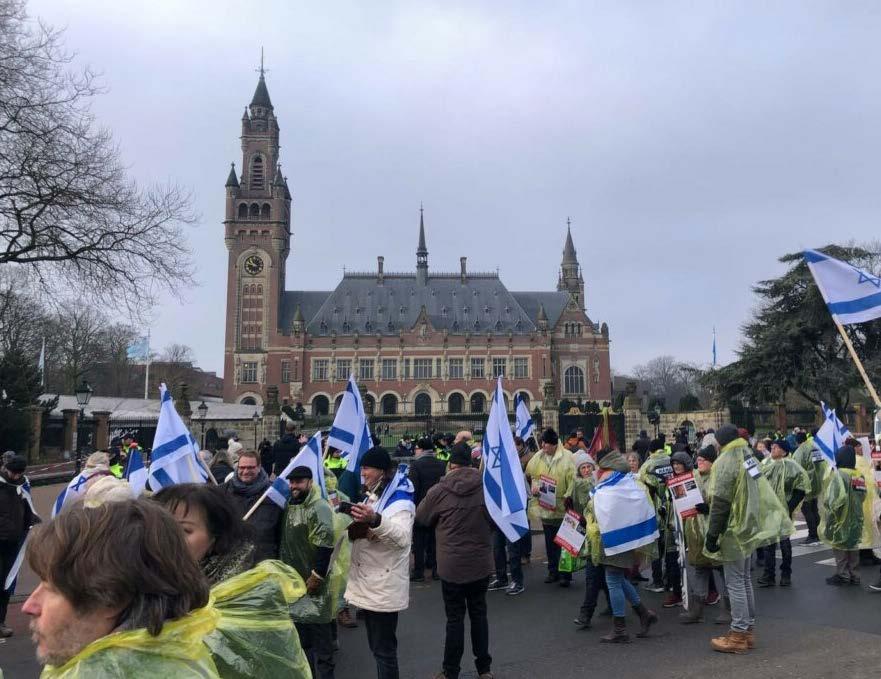
Though the International Court of Justice tends to be more of a political body than a truly impartial court, Israel should make a good showing due to the poor case made by South Africa and the strength of its own case.
South Africa claimed Israel is committing genocide in Gaza due to 1) the high civilian death toll; 2) the extensive damage the IDF is causing; 3) the lack of aid relief to civilians in Gaza; 4) the restrictions on fuel; and 5) the harsh rhetoric of Israeli leaders against Palestinians. These charges can all be easily refuted by Israel, although the hostile remarks against Palestinians will take some finessing.
Unmentioned Facts
What really stands out, however, is all the hugely important facts the South Africa team failed to mention. For instance, they never said one word about the Hamas terrorist invasion of October 7 that left 1,200 Israelis dead—mostly innocent civilians brutally murdered in their
Perhaps most telling of all, the South Africa team dared not speak about Hamas’ own genocidal, jihadist agenda, which is openly spelled out in its founding charter as a sacred Islamic duty to eradicate the Jews both in Israel and worldwide. They also were mum about how UNRWA and other UN agencies have aided Hamas in brainwashing the entire population of Gaza with this genocidal agenda and death cult mentality. So there is plenty for Israel to fill in to give the court a clearer picture and proper context for recent events in Gaza. Still, the panel of justices could already be stacked against Israel, and we may see some sort of novel ruling that demands Israel stop certain actions, which would ease the pressure on Hamas. But if the court does its job right, South Africa’s shameful legal maneuver will backfire, and all these endless, inverted accusations of genocide against Israel will hopefully start to lose their steam worldwide.
For more on this topic, be sure to watch the ICEJ webinar recording on “The Genocide Petition against Israel,” hosted by ICEJ Vice President & Senior Spokesman David Parsons and featuring special guest Andrew Tucker, International Lawyer and Director of Thinc, at: www.icejusa.org/genocidepetition-against-israel/
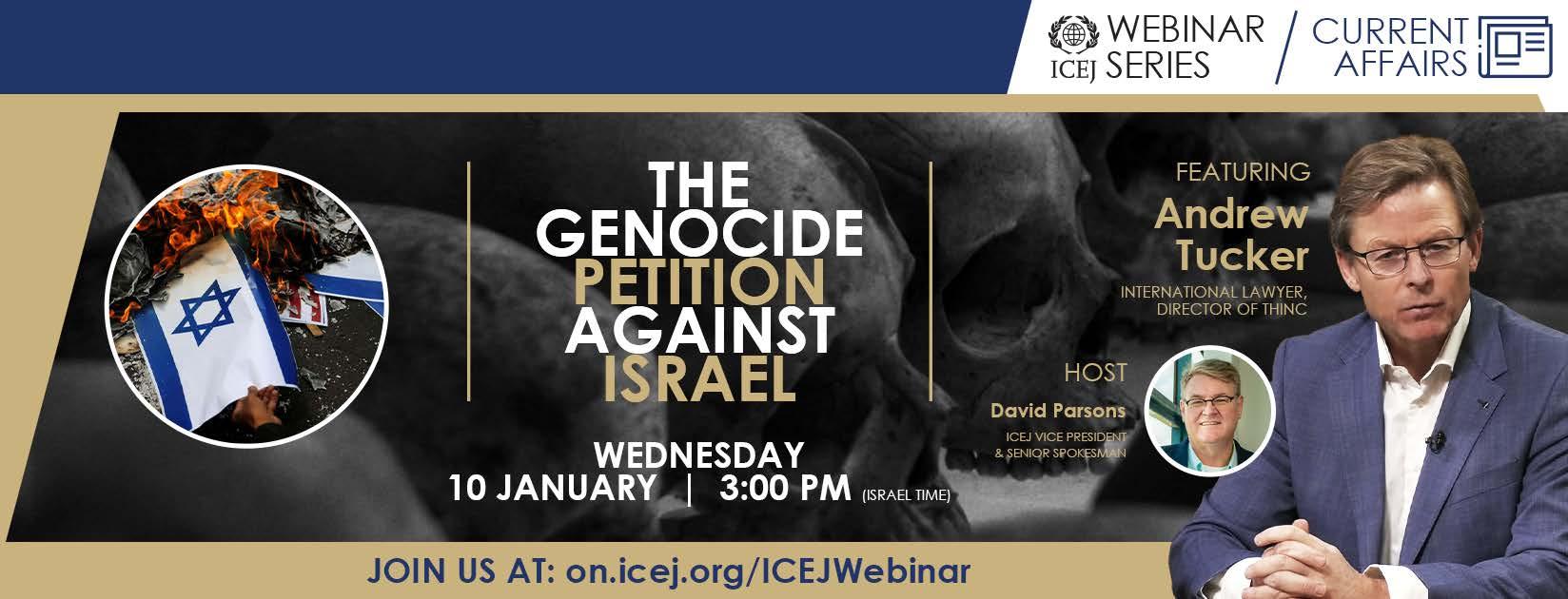
13 |WORD FROM JERUSALEM
ICEJ COMMENTARY
Demonstration at The Hague during the Israel genocide hearing

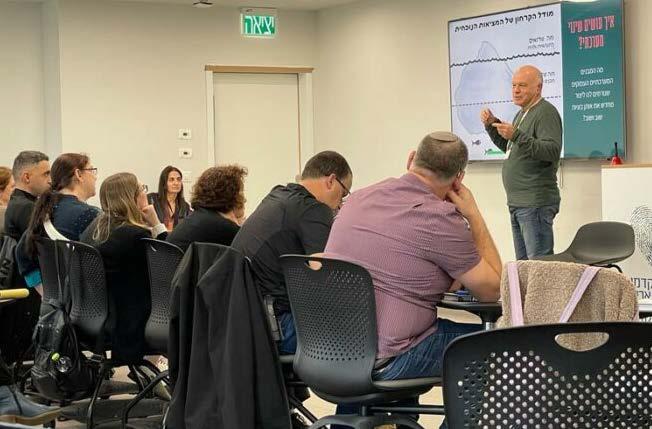
IICEJ PROVIDES TRAUMA TRAINING FOR ISRAELI MEDICAL PROFESSIONALS
BY NATIVIA SAMUELSEN
f there is one overwhelming need in Israel today, it is trauma care. Even veteran trauma counselors are overwhelmed as they deal with the deluge of patients still struggling with the shock of the October 7 massacres.
The same is true in Israel’s medical field, which has long been an inspirational example of Jewish-Arab coexistence. Yet those collegial bonds have been tested by the mass Hamas pogrom and its aftermath, as Israeli medical professionals and emergency first responders from all ethnic and religious backgrounds grapple with the trauma triggered by that dark day.
Since that tragic October morning, surveys show a 30 percent increase in Israelis suffering from depression and anxiety, according to a Jerusalem Post report. In response, caregivers in the medical field urgently required trauma and resilience training to help them cope themselves so they could then help others.
Extra support is particularly critical at this intense time—the increase in patients and shortage of medical professionals has overburdened those caring for the many wounded and traumatized Israelis. Aware of these challenges, Nicole Yoder, ICEJ Vice President for AID & Aliyah, sought to do something meaningful in response.
“We jumped at the opportunity to partner with the Joint Distribution Committee to sponsor a pilot course on resilience and trauma training for 30 select managers from hospitals around Israel, knowing it would positively impact thousands,” Nicole stated. “We learned so much as we spoke with participants about the challenges that they face on this internal war front.”
Tamar Granik, director of the JDC-Tevet programs, outlined for Nicole the aims and benefits of the nationwide trauma training program for medical professionals being sponsored by the Christian Embassy.
“No one was ready for this situation,” Tamar explained. “We went from “We don’t know what to do” to managing the crisis, then to normalizing the status of the crisis each day. We are grateful for this training on the topic of dealing with tensions between the Arab and Jewish sectors. It is a burning issue for our leaders. In this setting, there are arguments, different languages, and cultures. Right now, everything is shaking.”
As a result, there was an urgent need to expand resilience training to ease tensions and improve the work environment, for the sake of all the patients needing medical care.
“Through this course and the support network, leaders in healthcare can meet with other peers in the medical field, discuss challenges, and receive the necessary tools to respond to the many arising issues,” added Tamar. “No other country in the world would have something similar; this is a very uniquely designed program for Israel.”
Indeed, Israel is becoming a world leader in trauma care—whether they wanted to be or not.
Consider Shauli, who must juggle his IDF reserve duty, being a father of three children, and his work as the head nurse in emergency medicine at the Ziv Hospital in Safed. Asked about his most difficult tests, he answered: “The biggest challenge is the tangible stress in the air. Staff have lost loved ones and friends and are daily seeing the effects of the terror attacks on victims,” he said. “Furthermore, in this current
14 | FEBRUARY 2024
ICEJ AID
Medical professionals receive trauma training through a program sponsored by the ICEJ
war, we do not have enough staff or resources, and we haven’t even entered the worst situation if war breaks out on the northern front.
“I am using the tools I’ve gained here to create more peaceful ways of working by giving my team tools to deal with stress and trauma in a good way,” Shauli continued. “We need this because this is a situation we have not experienced before. We treated young people from the music festival in the South and have seen injuries from atrocious acts of terrorism. As a result, my team is facing major secondary trauma.”
Nicole also spoke with Monique Atias, head nurse of the maternity ward at the Soroka Hospital in Beersheva. This maternity ward is one of the largest in Israel, with more than 17,000 births annually. Monique shared how one-third of her staff were evacuated from affected communities near the Gaza border, and she was left to find new workers to replace them temporarily while still offering her evacuated staff support from afar.
“The mothers in the wards come with all kinds of challenges,” noted Monique. “Their husbands are in the army, so they may have no family support and they [often] have other children to care for. They face a lot of stress as they prepare to give birth. This course helps me train my team to help the mothers understand trauma while giving them a support net and the best care possible. All the things that I’m
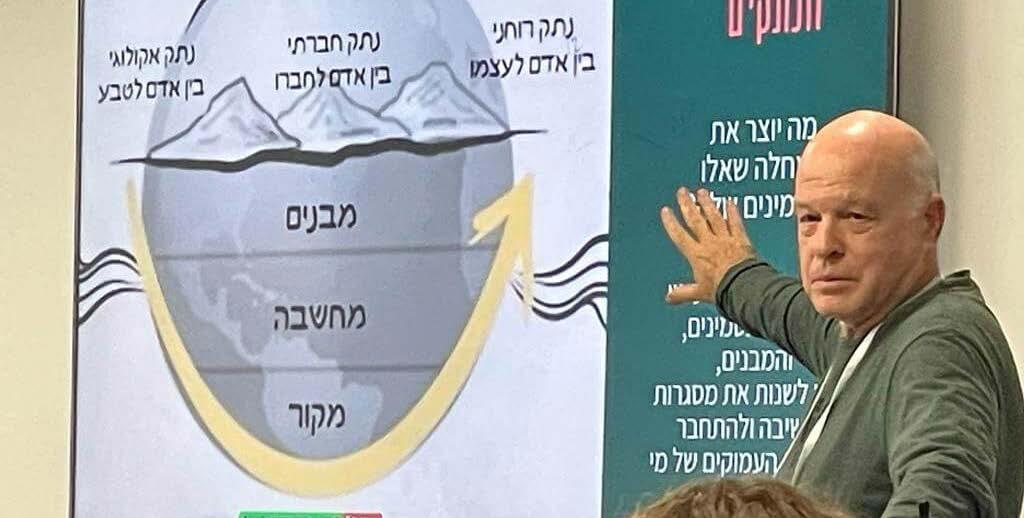
learning here are tools to help us do this better.”
Monique said in the days after the war began, she took an idea from the group training and arranged a meeting with all the Jewish and Arab caregivers and nurses in the ward. About that meeting she said:
As we talked, tears were often close to the surface, something I had not seen before in my team. The caregivers felt able to share how emotionally and mentally difficult they found it to support patients who might be from Gaza or even just from a community different from their own. In response, we discussed how to separate the war from ourselves as caregivers and the women as patients. This greatly assisted the staff and led to an incredible transformation. Thankfully, we have now overcome those initial emotional barriers.
One day this war will end, and life in Israel will continue, in all its diversity. Already, this training course has positively impacted 1,500 medical workers as managers implement their new approaches in medical departments around the country, leading to better medical care for all.
Please stand with the ICEJ as we help Israelis from all walks of life overcome together the traumas of the current conflict. Be part of these efforts by supporting our Israel in Crisis fund.
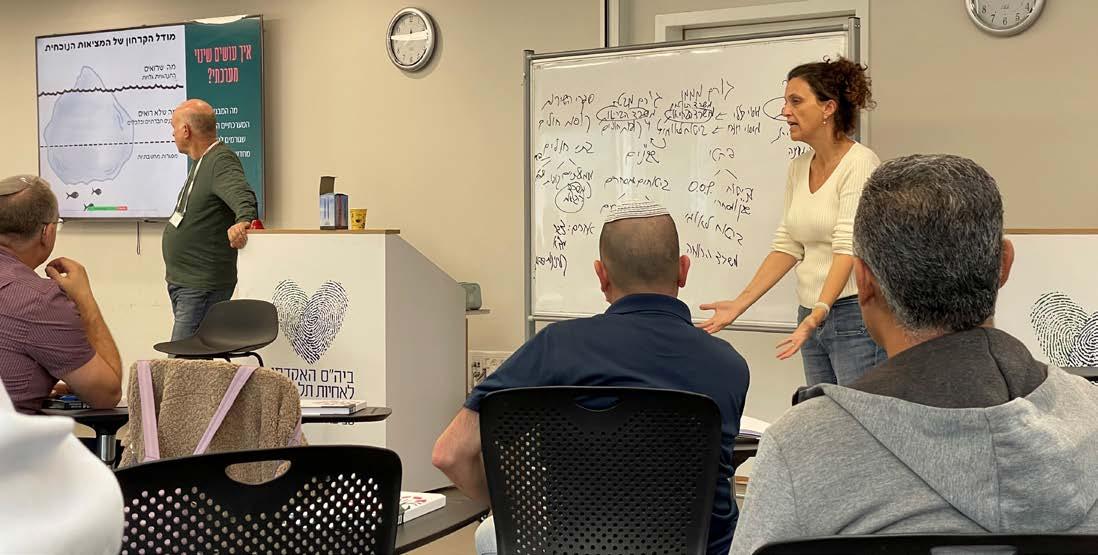
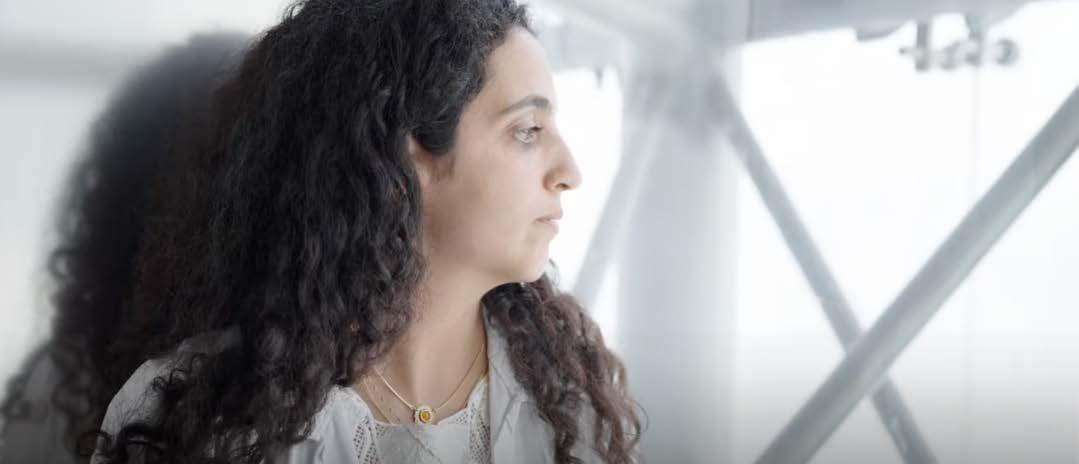
15 |WORD FROM JERUSALEM
Donate today at: www.icejusa.org/crisis
Medical Professionals’ Resilience Training
L earn more about the ICEJ-sponsored medical resilience training at: http://www.icejusa.org/training ICEJ AID
Photo credits: courtesy of JDC / Pexels-Jonathan Borba

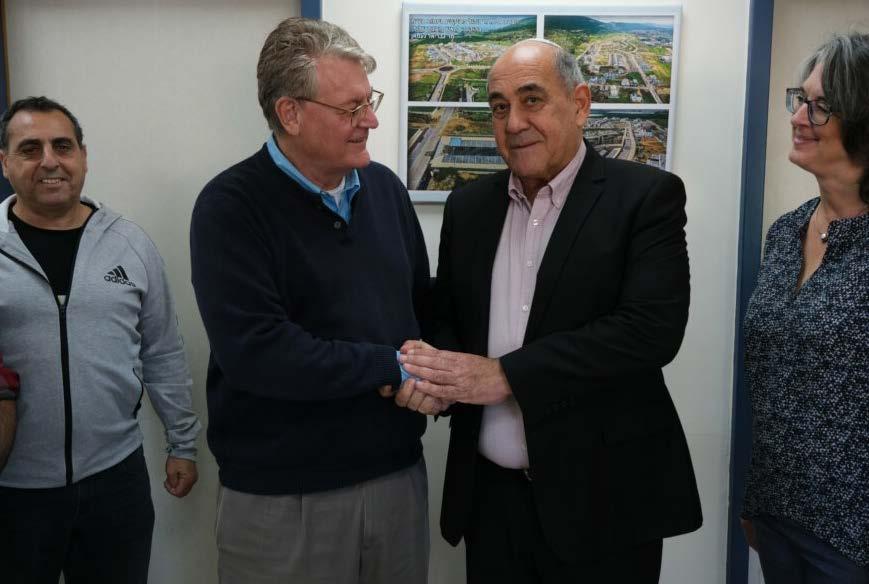
ICEJ “SHELTERING” RESIDENTS IN NORTHERN ISRAEL
JONATHAN A. PARSONS, ICEJ STAFF WRITER
Shlomi is a town of some 9,000 residents nestled in the green hills of the western Galilee just below the ridge line that divides Israel and Lebanon. This newer neighborhood lies less than 500 feet from the UN-demarcated border fence and the prying eyes of Hezbollah terror militia.
On our way to see Shlomi’s longtime mayor Gabriel Na’aman, we expected to see a ghost town—Shlomi is in a dangerous combat zone. Yet we were surprised to see people out and about and many people at work. Mayor Na’aman was quick to thank the ICEJ for donating 9 above-ground bomb shelters and renovating 73 existing underground shelters.
“Ever since Shlomi was evacuated about 10 days into the war, around 5,000 residents are spread among 27 hotels in Jerusalem, Haifa, and Tiberias, while the rest are staying with relatives elsewhere in Israel,” the mayor explained. “But 700 of our people, almost 10 percent, have returned to keep their businesses going, only because the shelters you provided are here to protect us.”
Asaf Gaveh, the town’s security chief, added that the shelters helped keep their citizens stay safe for the first nine days of the war, before they were able to evacuate Shlomi.
Back in April 2023, Shlomi had been struck by a barrage of rockets from Lebanon on the first day of Passover, sowing panic in the town. Shlomi did not have enough bomb shelters, and those they had were in dire shape. The town’s leaders started pleading with the Israeli government and military for help, to little avail. But when ICEJ Vice President of AID & Aliyah Nicole Yoder heard of this need, she visited Shlomi, and within two weeks, the first of nine mobile bomb shelters was delivered. The Christian Embassy also sponsored the complete renovation and upgrade of all 73 underground shelters in town.
“You worked so fast to provide these shelters,” said Gaveh. “The government has never done this.”
While the bomb shelters have helped alleviate some concerns over the rocket threat, Mayor Na’aman stressed another major threat is preventing residents from returning: “Our fear is not just that Hezbollah has many more rockets than Hamas but that their elite Radwan Forces have been planning to carry out the same kind of massacre on the northern border as Hamas did in the south on October 7.”
The special Radwan commandoes number more than 2,500 veteran Hezbollah fighters from the Syrian civil war who have been training with motorcycles and paragliders to attack villages and take hostages, just as Hamas did in the Gaza border area. Mayor Na’aman hopes for a diplomatic solution that will force Hezbollah back beyond the Litani River, about 18 miles north of the Israeli border, as required by UN Security Council resolution 1701, passed after the Second Lebanon War in 2006. Otherwise, he insists the only way for residents to feel safe enough to return is if the IDF itself rolls into south Lebanon to push Hezbollah back above the Litani.
After bidding the mayor farewell, we visited several refurbished shelters in Shlomi and then headed for Ma’alot-Tarshiha, a unique community of 22,000 people 4.5 miles from the border. It is made up of two adjoining towns—one Jewish and one Arab—that formed one joint municipality as a model of cooperation for the whole country. With the ICEJ’s help, the town is refurbishing 67 public shelters, with 41 at or near completion and 26 still needing repair.
Before and After
During our visit, we saw several shelters with completed renovations and others awaiting an overhaul. As in Shlomi, these shelters had fallen into disrepair since the 2006 conflict with Hezbollah and lacked proper lighting, ventilation, and plumbing, along with other major deficiencies.
The ICEJ hopes to cover the repairs and upgrades for all 120 existing bomb shelters in the two towns we visited—we just need to raise the funds for the last 26 public shelters in Ma’alot-Tarshiha. These shelters are even being fitted with new water pumps, circulation fans, and AC units, as well as toilets, sinks, and showers—and for good reason.
“After the 2006 Second Lebanon War, a study by Magen David Adom found that all the civilians who were killed during the war died because they left shelters with no toilets or broken toilets to go to the bathroom,” said Shmuel Bowman, director of our partner organization Operation Lifeshield. “That’s why I am so excited about these new bathrooms.”
Renovations That Save Lives
Over the last 15 years, the ICEJ has donated over 200 portable bomb shelters to vulnerable Israeli communities, some 50 of them along the northern border. This includes nine additional mobile shelters on order. In addition, we have built or renovated 125 underground shelters across Israel in recent years. These shelters have already saved many lives in Israel’s war with Hamas, and they help residents of these towns and villages have the courage and resilience to stay on the frontlines in the hardest of times.
We thank those who have helped provide so many life-saving shelters to protect Israelis under relentless rocket fire through the years and urge you to consider how you, too, can help deliver more shelters to at-risk communities on Israel’s borders—starting with the remaining shelters we want to repair in Ma’alot-Tarshiha.
16 | FEBRUARY 2024 Donate today at: www.icejusa.org/crisis
ICEJ AID
ICEJ’s David Parsons and Mayor of Shlomi Gabi Na’aman, along with ICEJ’s Nicole Yoder
ICEJ STARTS NEW YEAR WITH ALIYAH CAMP FOR JEWISH YOUTH
HOWARD FLOWER, ICEJ ALIYAH DIRECTOR
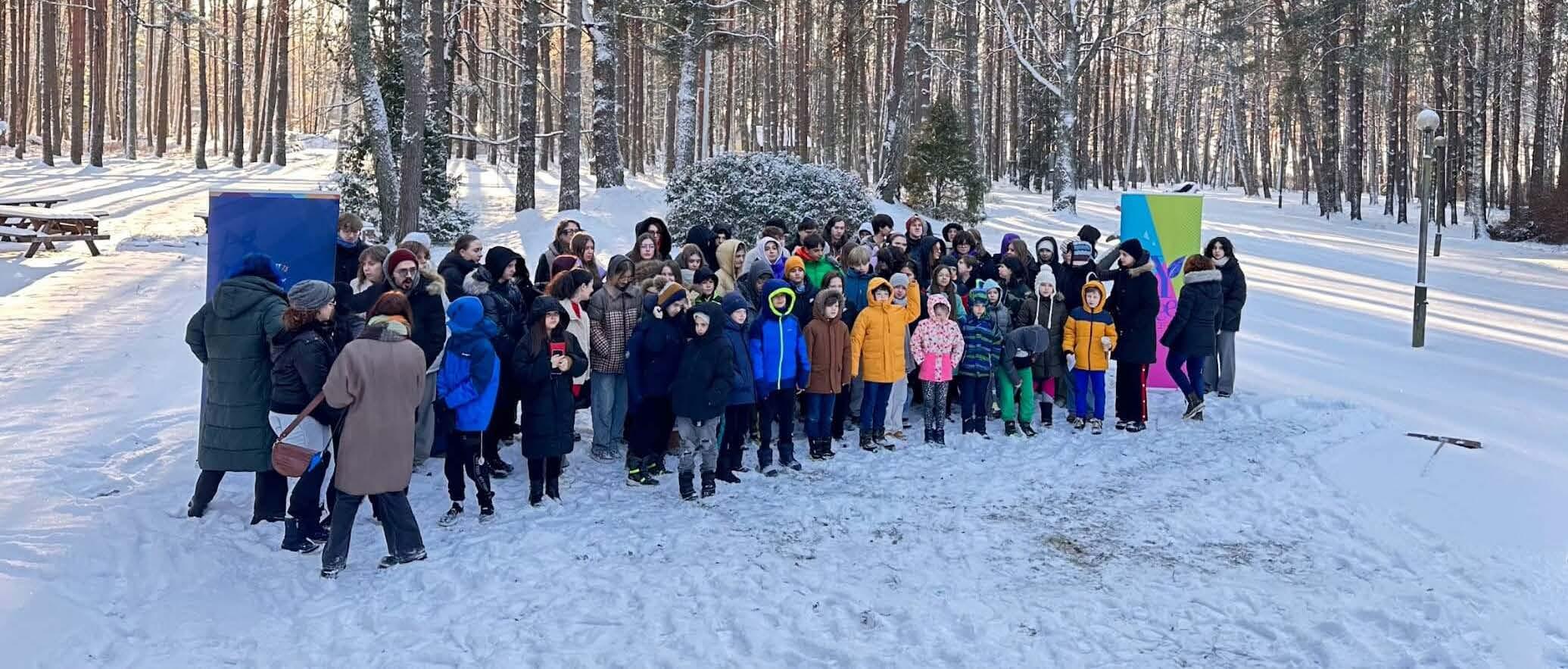
The war thrust upon Israel over recent months has left many Israelis traumatized, even while scores of Jews abroad are considering a move to the Jewish homeland to escape the rampant wave of antisemitism spreading worldwide. Already since that dark day last October 7, more than 4,000 Jewish Olim (newcomers) have arrived in Israel. As we start the new year, the International Christian Embassy Jerusalem stands committed to helping with war relief efforts here in the Land of Israel and, just as importantly, helping to prepare and bring home as many Jewish immigrants as possible.
2024 Aliyah Camps Have Begun!
One way we do this is by sponsoring Aliyah camps. In January, we sponsored a winter Aliyah camp for Jewish youths in the Baltic States—73 Jewish youth between 12 and 17 years old eagerly packed their warmest clothes and attended the camp for a life-changing adventure in chilly Latvia!
The atmosphere was festive as the youth arrived and began mingling. The Jewish teens, including Ukrainian refugee children now living in Poland, Germany, and the Baltic countries, as well as Israeli youth temporarily living outside of Israel, gathered on the shores of the Baltic Sea in Latvia between January 3 through 7. This winter camp, mostly conducted in Russian, was made possible through the generous support of Christian friends who gave through our Finnish, German, and USA branches.
Despite the freezing Latvian temperatures, which dipped as low as -4 degrees Fahrenheit, the young people made new friends while participating in various fun activities like a pajama party, navigating a web of strings, playing in the snow, and, most importantly, learning about Israel and embracing their Jewish identity.
The Christian Embassy has a long history of assisting with Aliyah summer and winter camps. More than 10 years before the beginning of the 2014 conflict in Ukraine, the Jewish Agency approached the ICEJ to help with Aliyah preparations in areas far away from the fighting in eastern Ukraine. Since then, the ICEJ has assisted with dozens of similar Aliyah camps and other preparatory gatherings in many countries, including Ukraine, Finland, Russia, Latvia, and Lithuania.
Surge in Aliyah Applications Despite War
These Aliyah camps play a crucial role in planting seeds deep within these Jewish youngsters for eventually making Aliyah to Israel. Although Jewish immigration to Israel has slowed somewhat since the start of Israel’s war with Hamas in early October, that stems from many prospective immigrants deciding to delay their Aliyah for a few months. The Jewish Agency for Israel (JAFI) reports that many more people have opened Aliyah application files since October than over the same period the year before—and no one has canceled yet. The slowdown so far is less than what occurred during the first months of the Coronavirus pandemic in early 2020, after which Aliyah dramatically rebounded.
Following a series of Aliyah fairs in France in late December, the Jewish Agency announced that more than 1,200 French Jews opened Aliyah files in the last three months, compared with only 220 in the same period the previous year—an increase of 450 percent. The Israeli daily newspaper Israel Hayom also reported that in the last quarter of 2023, nearly 4,200 American Jews submitted immigration requests— an increase of 122 percent over the same period in 2022.
Recently, Jewish Agency chairman Doron Almog boldly forecast that Israel could see as many as 1 million new Jewish immigrants in the next few years due to the mounting wave of antisemitism around the globe. Recently, at a special Aliyah conference in Florida, JAFI official Danielle Mor assured participants that the Agency could handle such a mass influx and was prepared to do just that.
The ICEJ is committed to bringing as many Jewish immigrants home to Israel as possible in 2024 and assisting them with fully integrating into Israeli society. Our Aliyah work first began in Vienna in 1980, and since then, we have assisted more than 175,000 Jews in coming home to Israel, including more than 5,000 in 2023, while helping many more throughout the integration phase.
Aliyah winter camps are just one way we are helping Jewish people prepare for returning to their biblical homeland. Thank you for supporting this prophetic call, and please continue to give generously to our Aliyah efforts.
17 |WORD FROM JERUSALEM
Donate today at: www.icejusa.org/aliyah
ICEJ ALIYAH
Participants in the ICEJ-supported winter Aliyah youth camp
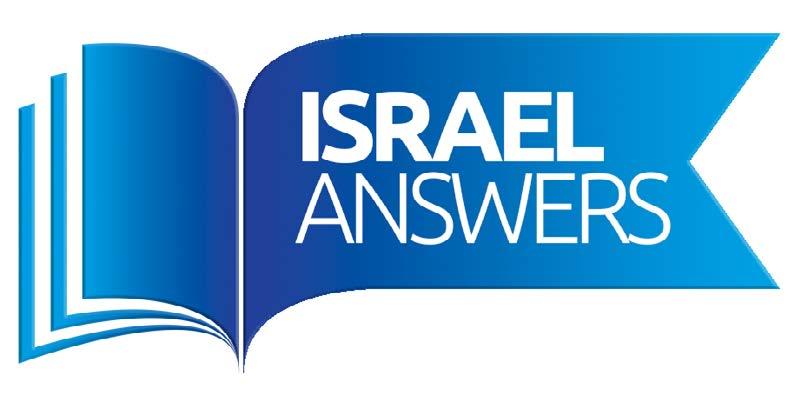
Your Israel Answer
5 Lies about 1948 and Israel’s Birth as a Nation
By Dr. Susan Michael, ICEJ USA Director
Since becoming a state in 1948, Israel’s enemies have continually attempted to defeat and discredit the Jewish State using any tactics that stick. For example, they’ve tried to weaken Israel economically with the Boycott, Divestment, and Sanctions (BDS) movement and diplomatically with the 1975 UN Zionism Is Racism resolution. But they’ve also done this by trying to weaken Israel in the “court” of public opinion by spreading lies about the creation of the Jewish State in 1948. Here are five of those lies—and how this evil disinformation is impacting global opinion about Israel’s right to exist today.
LIE #1 – Israel attacked the Arab nations in the 1948 Arab-Israeli War
In 1947 the United Nations voted to partition the area then known as the Mandate of Palestine into two states: one Jewish and one Arab. The Jewish community accepted this plan and began making plans to declare statehood, but the Arab world rejected it and began preparing for war. The day after Israel declared its independence on May 14, 1948, five Arab countries responded by launching a war to destroy the newborn state with the declared aim to eradicate it. Israel did not initiate this conflict but was obliged to defend its existence, integrity, and population. Casualties and displacement of people during the battle were not part of Israel’s design or intent to destroy the Palestinian people; rather, they were the results of armed conflict. Israel’s military response has always been defensive against Arab aggression. This is why Israel’s military is named the Israel Defense Forces (IDF).
LIE #2 – Arab countries invaded Israel because Israel expelled Palestinian Arabs
During the 1948 Arab-Israeli war, what Israel calls its War of Independence, between 550,000 and 700,000 Palestinian Arabs living in areas under Israel’s newly established sovereignty were displaced. Most left voluntarily or at the urging of invading Arab armies that advised them to flee and promised their return after victory in a few short weeks. Many never left “Palestine” but traveled a few miles to the other side of the fighting. Others crossed over into bordering Arab nations with the same language and ethnicity. Once the fighting ended and armistice lines were drawn, those outside of Israeli territory were not allowed back in, and sadly, instead of being welcomed by their Arab brethren, they were put into refugee camps, where many remain to this day. Israel did not expel Palestinian Arabs.
LIE #3 – The Jewish people illegally took the land of Israel in 1948
After Israel accepted the UN Partition Plan and declared statehood, Israel was recognized by the United Nations and, in 1949, was admitted as a full voting member by majority vote to the international body. This recognition by the United Nations placed a stamp of approval upon Israel’s founding and accepted the new Jewish State into the governing organization. Israel’s founding was legal and accepted by the international community as such.
LIE #4 – There were no Jews in the land of Israel prior to 1948
Israel’s enemies use this lie to back their claim that the Jewish people are “colonizers” of the land—they have replaced another indigenous people and culture. However, the Jewish people’s connection to the land goes back some 4,000 years when, according to the Bible, God bequeathed it to the Jewish people through an unconditional covenant with Abraham. The Bible also records the Israelites’ settlement of the land and the establishment of the Davidic Kingdom there. Even though over the next 3,000 years the Jewish people suffered two exiles, there was always a Jewish presence in the land—though sometimes small. It’s a thousands-of-years-old historical, genealogical, and archaeological fact: the Jewish people are indigenous to the land of Israel.
LIE #5 – Israel’s establishment was a “catastrophe” (Nakba) for the Palestinians
The State of Israel was established with the intent to exist alongside an Arab state in Mandatory Palestine. However, the Arabs’ refusal to accept the Partition Plan and their declaration of war resulted in the refugee problem. The Nakba was entirely their own doing and not the result of any action, inaction, or injustice by Israel. Conversely, if the Arabs had also declared statehood and pursued peace with the neighboring Jewish State, they would have benefited greatly and even become one of the most prosperous and free states in the Arab world.
Unfortunately, for countless people who don’t know the Bible or history, these and other repeated lies about the creation of the State of Israel and what happened immediately after have become their truth, especially with younger generations. Modern technology and social media have only exasperated this massive problem. We must not remain silent; we must fight untruth with truth.
18 | SEPTEMBER/OCTOBER 2020
18 |OCTOBER 2023
Get your questions about Israel answered at: www.israelanswers.com

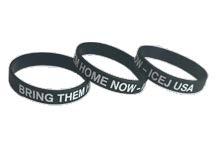
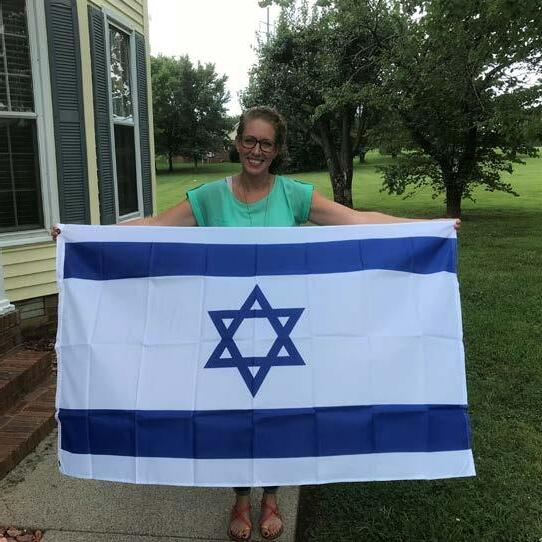
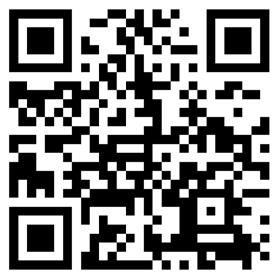




$20.00* ISRAELI FLAG 3’ x 5’ Flag Pole not included WINTER SALE! VISIT OUR ONLINE STORE AND RECEIVE A 25% DISCOUNT ON ALL PURCHASES www.ICEJ.store and use the discount code: “WINTER25” For full product descriptions, visit our online store! www.icej.store *PLUS SHIPPING ANOINTING OILS Cassia, Cinnamon, Frankincense Henna, Holy Anointing Oil, Prince of Peace, Rose of Sharon $9.99 PRAYER SHAWL 72” x 22” Prayer shawl with matching bag $25.00* SOLIDARITY BRACELETS BRING THEM HOME 10 -19 bracelets 20 -100 bracelets A minimum order of 10 bracelets ENCOUNTER THE 3D BIBLE: How to Read the Bible So It Comes to Life STUDY GUIDE $4.00 ENCOUNTER THE 3D BIBLE: How to Read the Bible So It Comes to Life $15.00 $2.00 each* $1.50 each*




























































